#and how that manifested into silver's experience growing up
Note
Sorry if I'm a bit late in asking, but for the settings prompts can I humbly request 50. a childhood room with melenore and lilia? If not melenore then silver 😁
the child had been loved, unmistakably so.
lilia hadn't needed his unique magic to feel the traces of such affection in the hand-carved whorls of the cradle, the silken blankets swaddled with care inside— it was difficult to imagine the knight of dawn as an emotional man and his dear princess would have never shown her face near the dangers of battle, but four hundred years later lilia's knees still remember how they nearly buckled under the lingering weight of love that haunted the cradle, the blankets, and the boy embraced by it all.
see the childhood room that the little prince has slept in while the world yawned, turned, and forgot— a bower of thorns, the cold arms of a watchful castle, steadfast in the guard of its precious charge. a silent parade of ghosts that line this empty hall, invisible even to the sorrowful light of the moon that illuminates the small cities of dust gathered in every nook and cranny. a quietness that wraps it all up like a shroud, like a tomb, and it has come to lilia to be the one to roll the rock from its place.
this is the legacy of a nameless prince.
lilia knows not of the tapestried room in the towers high above, their colors stripped and faded, their glorious scenes eaten away by curious moths and mice alike. he knows not of the soft, handmade toys arranged neatly along a windowsill, drooped and fallen with time— some by clumsy fingers better suited to a sword, others with kindly stitched smiles and elegant clothes, a testament to royal embroidery. he knows not of the woman that watches him from afar and weeps, her arms to remain forever empty and bereft of her child's warmth. he knows not of the man that stares at him with a desperation reserved only for the lost, the way that the room above him groans and creaks like a plea.
lilia sweeps the whimpering babe up into his arms, cooing to it with a tenderness no fae in living memory could possess towards a human. the child blinks at him with wide, wet eyes, and he finds himself tapping a claw gently against a pudgy, tear-stained cheek, the sudden gesture drawing out a fit of watery giggles from the boy at the odd sensation.
"come now, silver," he murmurs to the child, turning on his heel in a whirl of dust. "we best find some better accommodations than this dim old place if we are to live together now, hm?"
#lettie's asks#twst spoilers#twisted wonderland silver#twst silver#lilia vanrouge#twst lilia#this is several months old im so sorry#i cannot remember what this prompt could have been but#i wanted to write about how lilia probably never had a childhood room#and how that manifested into silver's experience growing up#instead; i got sidetracked#oh well....for another prompt perhaps#lettie writes
82 notes
·
View notes
Text
Pick a picture ♔ 𝔜𝔬𝔲𝔯 𝔩𝔢𝔤𝔞𝔠𝔶
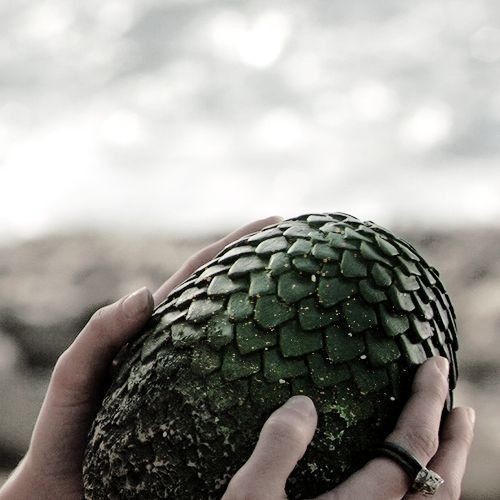

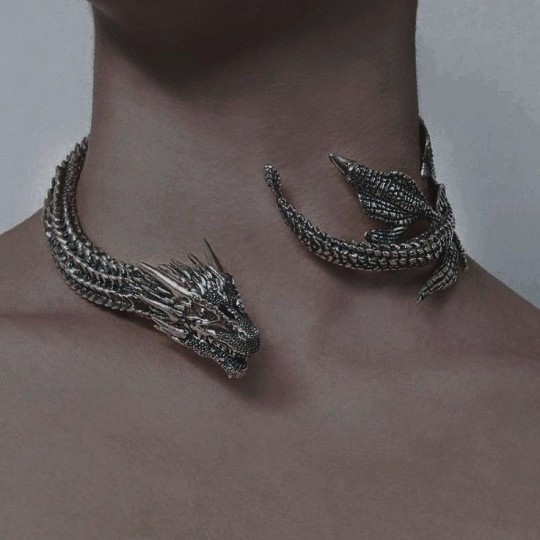
1. 2. 3.
The definition of “Legacy” is something that is passed on. But Legacy can take many forms. A Legacy may be of one's faith, ethics and core values… A Legacy may be monetary or your assets… A Legacy may come from one's character, reputation and the life you lead – setting an example for others and to guide their futures.
To book a personal and in depth reading with on this topic or any other query you have with me DM or email me at [email protected] with your name and query
Services Offered
Reviews
Thanks for the tip 🌹
Picture 1
You'll be known for the bonds you've built and cultivated.
For some this can manifest as a love story or relationship that sets an example or standard for others. That despite distance or inherent differences or your past how you showed up for each other and how you treated one another whether it lasted or not.
You'll leave behind a community that feels like a safe haven to a lot of people.
Some of you may have a legacy of a healthy loving family with strong values and morals. You've chosen not to pass down the pain or trauma you've endured or been projected upon and decided to break the cycle instead.
You may also make a shelter or donate to them or start a business or community that grows bigger with time that encourages people to freely express themselves or experiment with things that haven't been done before.
You're a humanitarian at heart even if there are days you don't see the humanity in people.
You will inspire others to break cycles that are detrimental to them.
Your energy is very encouraging and kind yet creative and prone to discovering new things, always seeking to find the silver lining in the worst situations. You do have excellent foresight and try not to get swayed by the doom and gloom surrounding the world. You seek to bring at least one, however small hopeful and beautiful thing into this world and you will succeed in the same.
Picture 2
Wealth and power. Lot of it.
I believe this is my saturn in aquarius group or saturn and/or jupiter dominant group.
You have endured a lot in your life so far, it may feel like you're centuries old inside a tiny body sometimes.
You'll be known for something no one or very few have done. I believe you'll pave the way for others.
Your mind and your subconscious is the most powerful asset you have. Use it well.
You'll have success in foreign lands.
Your wealth and sucess will be accumulated over time. So you might be a late bloomer but this will be to your advantage.
You'll be known for your wisdom, discipline, eccentricity, experimental, optimistic and diverse nature.
Quite a lot of people will look up to you even though you'll prefer to live a life of privacy.
Picture 3
You'll be known for your words and the way you've healed people through your gifts.
Perhaps you're mercury or water dominant?
Your art, your idealism, your vision, the way you romanticise your life and seek out your dreams.
You also know how to express pain, grief and disappointment in ways that gives others a chance to relate and heal.
I see you perfecting something overtime or getting stronger with what you already possess.
You'll likely have a victory you'll feel guilty over but soon learn to forgive yourself for and realize that you deserve good things too without harshly judging yourself for it.
Some of you may be singers, actors, cinematographers, visual artists, painters, psychics, healers, physicians, therapists etc
You'll be a muse and mystery to others like they haven't comprehended your true essence or your heart but will always remember your beauty, compassion and the way your words or your presence has impacted them.
I feel a lot of people might see you as illusive and unattainable or a complete mystic and some will see you rather motherly regardless of gender, intuitive and extremely intelligent. Someone ahead of their time.
#Pick a card#PAC#Pick a picture#Pick a card your legacy#Your legacy#tarot community#free readings#divination community#Spirituality#tarot readers#tarot readers of tumblr#Pick a card reading
744 notes
·
View notes
Text
Journal prompts for dealing with your triggers
What's that one thing that never fails to make your eye twitch? Describe it in all its triggering glory.
When did you first notice this trigger creeping into your life? Was it like a ninja in the night or more of a "bam, I'm here" situation?
Give your trigger a name. Go on, get creative with it. Something like Captain Cringe or Drama Llama. Own that trigger, fam!
How does this trigger manifest physically? Sweaty palms? Eye rolling so hard you can see the back of your head? Paint us a vivid picture.
Dig deep and uncover the root cause. What childhood trauma or embarrassing moment might be hanging out in the shadows, pulling the trigger strings?
Think about the last time this trigger ruined your day. What happened, and how did you react? Were there tears? Swearing? A dramatic exit?
On a scale from 1 to "I need therapy ASAP," how much does this trigger control your life?
Imagine your trigger is a character in a movie. Who would play it, and what would its catchphrase be?
List three situations where this trigger is most likely to pop up uninvited. Prepare yourself, Sherlock, we're going detective mode.
If your trigger had a theme song, what would it be? Bonus points if you can hum it while writing.
Flip the script! How can you reframe your thoughts when this trigger comes knocking? Turn that negativity into a comedy show, my friend!
Explore your coping mechanisms. Do you drown your sorrows in ice cream, or are you more of a scream-into-a-pillow kind of person?
Have a heart-to-heart with your trigger. What would you say to it if it were sitting right in front of you? Get sassy if you need to.
Reflect on a time when you conquered this trigger like a superhero. What powers did you unleash to defeat the villain?
Create a "Trigger Emergency Kit" – a go-to list of things that make you happy and distract you from the trigger madness. (Hint: Puppies and pizza are solid options.)
If your trigger were a meme, what would it look like? Embrace the meme magic, my friends.
Channel your inner therapist. What advice would you give your bestie if they were dealing with this trigger?
Journal your dream scenario: You, your trigger, and a boxing ring. Who wins, and how epic is the victory dance?
Share your trigger struggles with a friend. You're not alone in this, and sometimes a good laugh with a buddy is the best medicine.
Write a letter to your future self, giving them tips on how to handle the trigger like a boss.
Map out a "No BS" plan for dealing with the trigger next time it shows its face. No excuses, just action!
What would your favorite fictional character do in the face of this trigger? WWJD (What Would James Bond Do)?
Explore the silver lining. Is there anything positive you can extract from this trigger experience? Growth, resilience, a killer stand-up routine?
Imagine your trigger as a superhero origin story. What traumatic event turned it into the complex character it is today?
Create a mantra to repeat when the trigger strikes. Something like "Not today, Satan!" but tailored to your unique situation.
Draw a comic strip illustrating a day in the life of you versus your trigger. Spoiler alert: You're the superhero.
Journal your progress. Have there been moments when this trigger had less power over you? Celebrate those victories, no matter how small!
Write a breakup letter to your trigger. It's time to kick that toxic relationship to the curb.
Explore the possibility that your trigger is secretly your BFF in disguise, just trying to toughen you up. What valuable life lessons is it attempting to teach?
Reflect on how you want to grow beyond this trigger. What kind of badass version of yourself will emerge from the trigger ashes?
#journal prompts#journaling#journal#journals#trauma journaling#trauma journal prompts#shadow work journal#shadow work prompts#writing prompt#trauma prompts
9 notes
·
View notes
Text
a year for a witch 🩷
JANUARY
★spellwork: change/ new beginnings, branching out, self purification, safety, and stability
★crystals: garnet, rose quartz, jet, onyx, amethyst, and cavansite
★smells: lavender and pine
★deities: Hera and Freya
★colors: navy blue, purple, black, maroon
★candles: yellow, brown, green, and orange
★herbs: thyme, angelica, peppermint
look forward to a great year ahead and search for new opportunities! make a list of all the goals you want to achieve and the dreams you've been brewing up inside of your mind.
FEBRUARY
★spellwork: growth, fertility, love, and self-love
★crystals: amethyst, jasper, moonstone, angelite, and bloodstone
★smells: sage and heliotrope
★deities: Aphrodite, Juno, Diana, Demeter, and Persephone
★colors: purple, light blue, and yellow
★candles: pink, red, and blue
★herbs: rosemary, pine, nutmeg, and myrrh
a time of love and happiness. you can manifest new relationships, platonic or romantic! new people mean new experiences. get out there and enjoy the world around you!
MARCH
★spellwork: balance, prosperity/ wealth, luck, and courage
★crystals: aquamarine, bloodstone, and jade
★smells: rose, jasmine, citrus, and honeysuckle
★deities: Mars, Tyr, Athena, Hecate, and Libera
★colors: light green, red, and purple
★candles: green, orange, brown, gold
★herbs: yellow dock, jasmine, and sage
★flowers: daffodils and cattails
a new season has sprung about! celebrate spring, and balance your life to be as peaceful as the singing birds coming back from migration.
APRIL
★spellwork: banish bad habits, confidence,
★crystals: diamond, quartz, emerald, and white sapphire
★smells: bay leaves, grass, and daisies
★deities: Aphrodite, Bast, and Ceres
★colors: pastel (pink, green, purple, blue), and gold
★candles: white, black, and yellow
★herbs: basil, chives, fennel, and dragon's blood
★flowers: daisies and sweet peas
do you ever wish your bad habits would just disappear? well, april is the perfect time to work on banishing bad habits. being a greater you will help your year turn out greater as you grow!
JUNE
★spellwork: transformation, communication, empathy, and clarity
★crystals: pearl, moonstone, alexandrite, citrine, and blue lace agate
★smells: lily of the valley and lavender
★deities: Juno, Hera, and Jsis
★colors: yellow-green and orange
★candles: silver, purple, and blue
★herbs: meadowsweet, dill, lemongrass,
★flowers: rose, honeysuckle, lily, and clover
a time of clarity. clear communication will help you achieve all of your goals during the end of spring.
JULY
★spellwork: manifestation, divination, and self-awareness
★crystals: ruby, carnelian, green calcite, and peacock ore
★smells: frankincense
★deities: Athena, Venus, and Juno
★colors: blue, gray, silver
★candles: silver, yellow, green, and purple
★herbs: lemon balm, agrimony, sandlewood, and myrrh
★flowers: waterlily, honeysuckle, and gardenia
AUGUST
★spellwork: growth, spiritual wellness, and protection
★crystals: peridot, onyx, and green sapphire
★smells: frankincense and heliotrope
★deities: Demeter, Ceres, Jsis, Venus, Hecate, and Diana
★colors: gold, yellow, and green
★candles: green, blue, and brown
★herbs: chamomile, angelica, bay leaf, fennel, rosemary, and lilac
★flowers: poppy and jasmine
after a long summer, it's time to check in with yourself. how have you been? has your year been plentiful so far?
SEPTEMBER
★spellwork: balance, femininity, and reflection
★crystals: bloodstone, sapphire, peridot, and rainbow obsidian
★smells: rose, lilac, and bergamot
★deities: Demeter, Ceres, Freya, Thor, Thoth, and Persephone
★colors: brown, yellow, and green
★candles:
★herbs: mugworth, thyme, valerian, and marjoram
★flowers: aster, morning glory, forget-me-not, and lilac
it's been a long year so far, and you might be losing your balance. reconnect to the world and find your place back on the tightrope.
OCTOBER
★spellwork: transformation, psychism, and divination
★crystals: opal, tourmaline, rose sapphire, and citrine
★smells: ginger, cinnamon, strawberry, and apple
★deities: Hecate, Diana, and Jshtar
★colors: red, orange, navy blue, brown, and gold
★candles: black, purple, white, and silver
★herbs: rosemary, catnip, sage, thyme, basil, and clove
★flowers: calendula and pennyroyal
after reflecting on the year, it's time to check up on the past, present, and future. death and life can be seen together, a thin line blurred in the late evening.
NOVEMBER
★spellwork: empathy, gratitude, and release
★crystals: topaz, onyx, and obsidian
★smells: rosemary, dragon's blood, lilac, pine, cedar, and mint
★deities: Bast, Circe, and Nepthys
★colors: white, purple, gray, sage green, and black
★candles: yellow, white, and blue
★herbs: ginger, hops, and wormwood
★flowers: daliah and white lily
Clocks - Luke Faulkner
DECEMBER
★spellwork: manifestation, luck, prosperity, and release
★crystals: serpentine, flint, and lapis lazuli
★smells: peppermint, cinnamon, and rose
★deities: Ra, Odin, Horus, Demeter, and Gaea
★colors: maroon, green, white, and gold
★candles: orange, red, and brown
★herbs: holly, ivy, mistletoe, juniper, sage, and cedarwood
you've accomplished so much this year! it's time to celebrate your achievements and release negative energy while spending time with friends and family. happy holidays!
#Spotify#pagan witch#wiccan#pagan wicca#pagans of tumblr#paganblr#wicca#wiccablr#wiccalife#witchy#motivation#motivating quotes#get motivated#goals
3 notes
·
View notes
Text
Me (or one sixth)
I am from my childhood bedroom’s peeling blue wallpaper,
from making the first snow out of asbestos.
I am from diluted orange juice and the sting of Tiger Balm on wounds that still haven’t quite healed.
I am from three generations — three sets of hands and one heart, all crammed into the kitchen corner folding dumpling skin, dog-earing them, as if creasing a page in our collective memories.
I am from my sister’s overgrown green onions, willowy jade stalks that shot up from the abandoned bath tub in the yard, towering over her. Sometimes I wonder if she could have been that tall, too, if given the space.
I am from dozens of torrented DVDs being tossed around like frisbees, the reflection of the sun on the silver disc casting tiny rainbows on scribbled-on walls — a light that has since been lost.
I am from my mother’s mouth, the manifestation of her wanting a girl and then getting three — one after another, like the mangoes that she said used to fall from the trees back in rural Laos.
I am from the rocky waves of the East Sea, from the rotting wood of the fishing boat that my father stowed away on, the salt of the ocean below almost as coarse as the demeanour of the border guards that stopped him.
I am from silent sacrifices and loud scrapes of my mother’s favourite fruit-cutting knife on the worn exterior of her wooden chopping board, each notch keeping tally of all the times we received a plate of fruit in lieu of an apology.
I am from days of absentmindedly gnawing on these fruits, the nectar both sweet and bitter on my tongue.
___
For this reflection, I chose to write an I-Am-From poem, as it served several purposes: it allowed me to heal my inner child by reengaging with an activity that I have not done since grade school, as did it prompt me to reflect on how much has changed since then — both in terms of my own personal development, as well as how I claim my identity and history.
Growing up, I had teachers that wove parts of their culture and identity into the classroom, and now that I am looking at myself through the objective lens of a future educator, I now find myself trying to synthesize and pick apart what facets of me should be presented when I am teaching and relating to my students. Jo Chrona describes our connection to identity as being “inextricably linked to learning […] it’s what connects us to the world around us, to the land that we are on” (4). She points out that our self-definition is integral to separating information into knowledge/content/skill bases, thus aiding us in streamlining and outlining what values and what learning should be happening under our watch.
Diving back into the idea of us being connected to the land, the process of penning this poem had me musing on my status as a child of the diaspora, with refugee parents. Land to me, ironically, ebbs and flows; Canada is both home and not. Land itself does not move, but the concept of it and how much I find myself in one place or another does. I do think that the “melting pot” of diversity that Canada prides itself on is to be lauded, however. It is in keeping these individual, non-homogenous experiences that allows a rich depth of learning. The Meininger article outlines that “only in a direct social environment in which people are not anonymous to one another [can] they can separate themselves from the disciplining, assimilating and annexing forces that dominate society” (35). Thus, by knowing who I am and what shapes my identity, I can be a better educator by including all sorts of backgrounds and experiences.
As I move forward, I will continue to ask myself: how much of myself will I show and how much will I conceal? How do I peel back biases that may have come with my cultural upbringing in order to better listen and support those around me?
Chrona, J. (n.d.). First Peoples Principles of Learning. Open School BC. Retrieved November 7, 2023, from https://www.openschool.bc.ca/indigenoused/pdf/Module2VideoTranscript.pdf
Meininger, Herman. (2013). Inclusion as heterotopia: Spaces of encounter between people with and without intellectual disability. Journal of Social Inclusion. 25-44.
0 notes
Text
My Take on Vampires
Alright I got inspired by some earlier posts I saw about how weaksauce vampires are in modern pop culture, so I thought I'd write down my own take on the standard sexy monster.
This is mainly for use in the D&D setting I'm very slowly putting together, so I'll refer to things like non-human mortals, wizards, divine magic, etcetera.
Vampires have ashen, dull skin, piercing eyes, and sharpened teeth and claws. Their eyes glow blood red while using their powers, or when they're in states of heightened emotion. Their teeth can grow longer and sharper during feeding, and their jaws can open unnaturally wide.
Vampires are capable of shapeshifting (more on this later), with bats being among their usual forms. They can also sprout their bat wings while in humanoid form.
The only ways a vampire can die are being burned to ash by light, or by being staked through the heart with sanctified oak wood and decapitated afterwards.
If a vampire is not decapitated after being staked, it will merely pin them in place, paralyzing them. While in this state, the vampire will remain fully conscious.
While in direct sunlight, a vampire will not immediately die. They will first lose all of their powers, and experience extreme physical discomfort. Eventually, their skin will begin to burn, blister, and peel, before igniting and burning away to ash. The exact length of time this takes depends on the individual.
A vampire's powers and weaknesses are tied directly to each other. As a vampire's power grows, so too does their susceptibility to their weaknesses. For example, a freshly-made vampire who has yet to drink blood from another person would be almost indistinguishable from a mortal. They would be able to walk in the sunlight with ease, and would be unbothered by holy symbols, but they also wouldn't be much faster or stronger than a mortal, and would have no extra powers. However, a vampire lord who had devoured thousands of people would be much, much stronger, but would light up like a Christmas tree in a matter of minutes of being exposed to the sun.
Concentrated beams and blasts of light kill vampires much faster.
Vampires are somewhat vulnerable to silver, albeit less so than werewolves. The most curious way this manifests is that silver-backed mirrors won't reflect a vampire's image. Mirrors that use no silver in their construction can reflect a vampire, however.
Vampires feed exclusively on the blood of the living. Mortal food and drink always taste vile to them, and give them no nutrition.
Different blood types taste different to a vampire. Which tastes better depends on the individual.
Different species also taste different. Tieflings are spicy, and dwarves have a more metallic taste. Elven blood is akin to alcohol, but Drow specifically are toxic to vampires, and will make them sick.
Vampires can feed on non-sapient life, but it's not good for them. It weakens them, and will eventually reduce them to a withered, bestial state.
Vampires gain no actual nutrition from their meals, as they are not alive anymore. Instead, the blood is a means to transfer and consume the soul of their victim. This soul then fuels the unholy magic that keeps the vampire animate.
A vampire turned before reaching their physical prime will continue to grow until they reach that level.
If a victim were to freely offer their blood and soul to the vampire, then the vampire would become significantly more powerful.
As long as they keep drinking, they will remain at that state.
A vampire that doesn't drink will weaken, and age at an accelerated rate. Resuming feeding will gradually restore their youth and vitality.
Someone drained by a vampire doesn't automatically become one. The soul-drained remains will typically become a shambling husk, like a zombie. The corpse must be fed the blood of a vampire to rise as one.
Because the victim's soul is devoured by their killer, and then replaced with a part of them, it takes enormous mental strength to retain one's sense of self after vampirisation. A freshly-made vampire will usually be a completely different person to who they were before.
If a victim is fed vampire blood before dying, they will become a vampire without dying, and retain their normal self. They will be mentally linked to the vampire until the vampire is killed, however.
As is expected, vampires are supernaturally strong, fast, and have enhanced senses, including superior smell and hearing, night vision, and a sort of X-ray vision that allows them to see another person's circulatory system specifically.
As mentioned above, vampires can shapeshift. The most common alternate form is a bat, but they can also become wolves, rats, and other animals perceived as frightening by the society they were part of before death. So if someone from a culture that viewed hamsters as terrifying became a vampire, they'd be able to turn into a hamster.
They can also become swarms of small animals, though this is risky, as this swarm being separated or partially destroyed can leave the vampire's mind incomplete, missing memories or personality traits.
Mist forms are also common, typically red, black, or green in colouration.
Vampires are fully capable of casting aside all semblance of humanity and assuming the form of a humanoid bat monster.
Perhaps the most sinister aspect of a vampire's shapeshifting ability is the capacity to take the form of any of their previous victims, using the soul they consumed as a disguise.
As stated above, only light and the stake/decapitation combo can kill a vampire. In other cases, they will simply regenerate their form from any injury, growing back limbs and even their head.
Silver weapons can hinder a vampire's ability to heal, but won't stop it entirely.
Of course, vampires are also capable of hypnotising their prey.
As far as weaknesses go, light, oak, and silver have already been mentioned. The other most famous one is holy symbols, which prevent vampires from approaching any who wield them. However, the holy symbol of a god that likes vampires won't do anything to them.
More esoteric weaknesses like being unable to cross running water only apply to the more powerful vampires.
Requiring an invite to enter someone's place of residence only applies to those of equal or greater social standing to the vampire. They are, after all, an aristrocratic monster.
Vampires that don't feed as much can struggle with intimacy, ironically enough. After all, if you feed on blood, and have enhanced senses, then someone blushing is just going to make you hungry.
Lacking a true soul of their own, vampires aren't particularly inclined with normal mortal magic forms. However, they are by far the best practitioners of blood magic, appropriately enough.
So yeah that's basically how they work. I've probably forgotten some stuff or skipped things over, so feel free to ask about more details.
Also have some vampires.


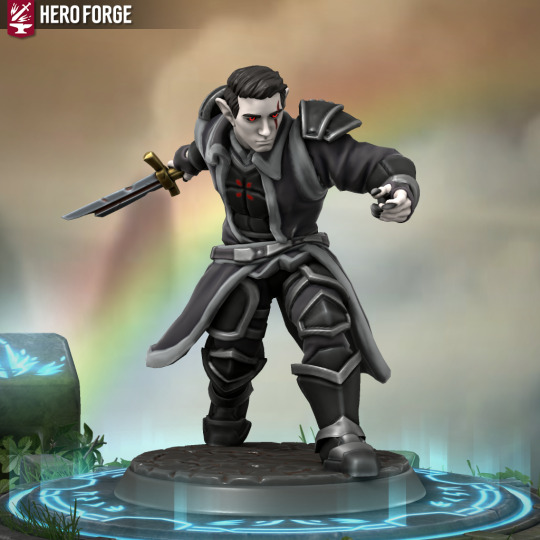





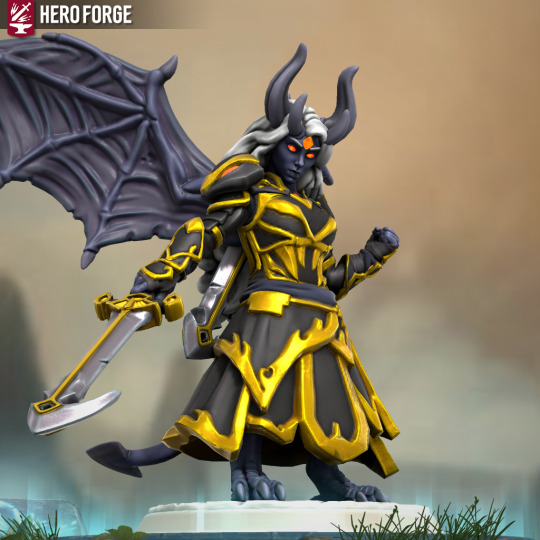
#Vampire#Vampires#D&D#Dungeons and Dragons#Worldbuilding#Korusca of the Grave of Saints#Kestrel Verne
1 note
·
View note
Text
Saturn in Sagittarius: Meaning, Traits & Compatibility
Saturn in Sagittarius is like having a strict personal trainer who won’t let you skip leg day but also rewards you with a gourmet cheat meal afterward.
On the upside, Saturn in Sagittarius brings a love for adventure and a drive to seek knowledge.
But brace yourself, because this cosmic taskmaster also brings a tendency to be overly critical and stubborn.
It’s like having a strict professor who grades harshly, but if you pass the final exam, you’ll come out a certified badass.
Saturn in Sagittarius may be tough, but it’s worth the effort.
What Does Saturn in Sagittarius Mean?
Limitless Responsibility
They are often the ones who make sure everyone stays on track and responsible.
Saturn in Sagittarius is an overgrown teacher who makes sure their students know the rules before they learn how to color outside of the lines.
They hold space for growth and encourage taking responsibility seriously, but they can be a bit preachy about it.
Challenges for Growth
They are not afraid to face challenges head-on.
Saturn in Sagittarius sees the road to success as paved with obstacles, and they relish the opportunity to climb over every single one.
They embrace the struggle as a chance for personal growth, learning, and experience.
Learning Lessons
They are lifelong learners. Saturn in Sagittarius is inquisitive, curious, and always seeking knowledge.
They believe that regardless of their age or experience, there is always something new to learn and an opportunity to grow.
Spiritual Success
They are spiritually inclined. Saturn in Sagittarius is known for seeking an elevated sense of purpose and a higher level of consciousness.
They may be attracted to spiritual practices, religion, or philosophical inquiry as a way to achieve their goals and find their place in the world.
Success through Hard Work
They are dedicated to achieving success through hard work. Saturn in Sagittarius is willing to put in the effort required to achieve their goals.
They recognize that success is not handed to them on a silver platter, but rather earned through relentless hard work, determination, and perseverance.
Saturn in Sagittarius Strengths
The Outspoken Over-achiever
When Saturn is in Sagittarius, get ready for some serious ambition mixed with a side of sass.
They are the quintessential over-achievers who won’t shy away from speaking their truth, even if it means ruffling some feathers.
This is because Saturn’s influence brings in a sense of responsibility that cannot be ignored, and Sagittarius’ fiery nature makes them unafraid to take risks.
The Wisdom-seeker
Saturn in Sagittarius is like a wise philosopher who seeks truth and knowledge in everything they do.
They are the ones who will travel across the world to seek answers to life’s big questions.
They want to understand the world deeply and thoroughly and are not satisfied with surface-level answers or easy solutions.
Their goal is to gain wisdom and knowledge that will help them grow and evolve.
The Resilient Adventurer
Saturn in Sagittarius is like a resilient adventurer who never gives up, no matter how tough the journey gets.
They are willing to take on any challenge, and won’t let setbacks or obstacles hold them back.
Saturn teaches them to persevere and stay the course, while Sagittarius gives them the energy and enthusiasm to keep moving forward.
The Free-spirited Rebel
Saturn in Sagittarius can also manifest as a free-spirited rebel who doesn’t conform to society’s norms.
They are independent thinkers who value their freedom above all else and won’t let anyone tell them what to do.
They are always seeking new experiences and opportunities to expand their horizons, and won’t settle for anything less than what they truly desire.
The Adventurous Sage
The combination of Saturn’s maturity and Sagittarius’ adventurous spirit creates a unique individual who is both wise and daring.
They are the adventurous sage who has lived a life full of experiences and has gained wisdom from every challenge they’ve faced.
They are the ones who can offer guidance to others while still embracing the excitement of life’s journey.
Saturn in Sagittarius Struggles
The Commitment-Phobe
When Saturn is in Sagittarius, they may struggle with committing to a relationship or a career path.
They crave independence and freedom, and the idea of being tied down to one thing can make them squirm.
They might find themselves jumping from one job to another or avoiding settling down with a partner.
Saturn’s lessons here encourage them to face their fears and learn to commit, but it won’t be an easy road.
The Clumsy Traveler
Sagittarius is known for its love of adventure and travel, but with Saturn in the mix, they may find themselves facing more mishaps than usual.
Flights getting canceled, luggage getting lost, and missed connections are all possible challenges.
Saturn’s lessons here encourage them to learn to adapt and stay calm in the face of unexpected obstacles.
The Disillusioned Dreamer
Sagittarius is a sign that loves to dream big and shoot for the stars, but with Saturn’s sobering influence, they may find that their dreams don’t quite match up with reality.
They may struggle to turn their visions into actual plans or feel discouraged when their efforts don’t yield immediate results.
Saturn’s lessons here encourage them to keep pushing forward and to focus on small, achievable goals.
The Over-Analyzer
Saturn in Sagittarius can make them hyper-aware of their own limitations and flaws.
They may find themselves spending more time analyzing their own behavior than actually taking action.
This can lead to self-doubt and second-guessing.
Saturn’s lessons here encourage them to learn to trust themselves and to take risks, even if it means making mistakes along the way.
The Risk-Taker
Despite the challenges that come with Saturn in Sagittarius, they are also capable of great courage and daring.
They may find themselves taking risks that others shy away from, whether it’s starting a business or embarking on a solo adventure.
Saturn’s lessons here encourage them to take calculated risks and to learn from both their successes and failures.
With a little perseverance and a lot of bravery, they can achieve great things.
Saturn in Sagittarius Man
The Adventurous Maverick
Saturn in Sagittarius Man is not one to shy away from a new adventure.
This man thrives on his independence and has a fierce desire to explore all that the world has to offer.
He’s the type of dude who will pack his bags and hit the open road to chase his dreams without thinking twice.
With the planet of discipline at the helm, he’s not just wandering aimlessly; he’s charting his course with a clear purpose.
The Intellectual Explorer
Saturn in Sagittarius man has a deep desire to expand his knowledge and understanding of the world around him.
He’s constantly seeking out new ideas and philosophies to challenge his own beliefs.
He’s the type of dude who will spend hours debating the meaning of life over a cup of coffee or lose himself in a good book for days on end.
With the planet of structure in the mix, he’s not just exploring for the sake of it.
He’s building a solid foundation of understanding from which to grow.
The Philosophical Realist
Saturn in Sagittarius man has a unique worldview that combines the idealistic with the pragmatic.
He believes in the power of positive thinking and the potential for greatness in all things, but he never loses sight of the practical realities of life.
He’s the type of dude who will dream big and then work tirelessly to make those dreams a reality.
With the planet of responsibility in his corner, he knows that success doesn’t come easy but that it’s always worth the effort.
The Charismatic Leader
Saturn in Sagittarius man has a natural magnetism that draws people to him.
He exudes confidence and charisma, making him a natural leader in any setting.
He’s the type of dude who can take charge of a room and inspire others to follow his lead.
With the planet of authority in his chart, he knows how to wield power with grace and humility, earning the respect and admiration of those around him.
The Masculine Seeker
Saturn in Sagittarius man embodies a unique blend of masculine traits that make him stand out from the crowd.
He’s confident, adventurous, and independent, but he also values emotional intelligence and personal growth.
He’s the type of dude who can balance his own needs with the needs of others, creating a healthy and fulfilling life for himself and those around him.
RELATED: Pluto In Sagittarius: Challenging The Status Quo
With Saturn’s lessons of maturity and discipline, he’s not just a man; he’s a seeker on a cosmic journey of self-discovery.
Saturn in Sagittarius Woman
The Wandering Sage
Saturn in Sagittarius women are like wandering sages on a cosmic journey.
They have a restless spirit that craves adventure and new experiences.
They’re not content with staying in one place for too long and prefer to move with the flow of life.
They’re natural explorers who seek knowledge and wisdom from all corners of the world.
The Disciplined Maverick
Saturn in Sagittarius women are known for their fiery and independent spirits.
They have the discipline and focus to pursue their goals with unrelenting determination.
They’re like mavericks who do things their own way, regardless of what society expects of them.
They’re not afraid to take risks and push boundaries, but they always do so with a calculated plan in mind.
The Optimistic Realist
Saturn in Sagittarius women have a unique perspective on life. They’re optimistic and hopeful, but they’re also grounded in reality.
They understand that life isn’t always sunshine and rainbows, but they choose to focus on the positive aspects of life.
They’re natural problem-solvers who approach challenges with a can-do attitude.
The Feminine Trailblazer
Saturn in Sagittarius women break the mold when it comes to traditional femininity.
They’re not afraid to challenge gender norms and be true to themselves.
They embrace their individuality and refuse to conform to societal expectations.
They’re trailblazers who pave the way for future generations of women to be unapologetically themselves.
The Wide-Eyed Visionary
Saturn in Sagittarius women have a big-picture perspective on life.
They see the world through a wide-eyed lens that’s always looking toward the horizon.
They’re visionaries who dream big and believe that anything is possible.
They have the determination and perseverance to make their dreams a reality, no matter how lofty they may seem.
Sagittarius Saturn – Love & Compatibility
The Fire Sign Connection
When it comes to love, Saturn in Sagittarius is all about that fiery passion.
So, it’s no surprise that other fire signs like Aries and Leo can handle their heat!
The intensity between these signs is a match made in the stars.
But, if you’re a water or earth sign, you may want to bring some sunscreen for this hot and heavy romance.
The Test of Time
Saturn in Sagittarius is all about commitment and long-term plans.
So, if you’re dating someone with this placement, be ready to buckle up for the long haul.
They’re not into casual flings and are always looking for something serious. But, if you can handle the ride, this relationship is sure to last.
The Life Lesson
Saturn in Sagittarius is all about learning from life’s experiences. They believe that every relationship is a chance to grow and evolve.
So, if you’re with someone with this placement, expect some hard-earned lessons along the way.
But, these lessons will only make your relationship stronger and more meaningful.
The Boundaries
Saturn in Sagittarius is all about setting boundaries. They know what they want and won’t settle for anything less.
So, if you’re dating someone with this placement, be prepared to respect their boundaries.
But, don’t worry, they’ll respect yours too. They’re all about open communication and honesty in their relationships.
The Adventure
Sagittarius is the sign of adventure and exploration, and Saturn in Sagittarius takes this to the next level.
They’re always up for trying new things and going on exciting trips. So, if you’re dating someone with this placement, be ready for a wild ride.
They’ll show you the world and make every moment together an adventure worth remembering.
Sagittarius Saturn – Career And Money
The career counselor
When Saturn, the cosmic taskmaster, takes his seat in Sagittarius, they can expect a challenging yet rewarding journey in their career.
Saturn in Sagittarius is all about exploring their true calling and seeking the path that aligns with their beliefs and values.
It may not happen overnight, but eventually, they’ll find the career that makes them jump out of bed every morning with excitement.
The financial pilot
Saturn in Sagittarius can be a tough taskmaster when it comes to financial matters.
They tend to be cautious with their money, and they avoid taking big risks.
However, under Saturn’s influence, they’ll learn to strike a balance between risk and caution, which will help them build a solid financial foundation for themselves.
The risk-taker
Although Saturn in Sagittarius may seem to play it safe with their finances, they are not afraid to take risks in other areas of their life.
They are willing to explore new horizons, travel to far-off lands, and try out new experiences.
Saturn in Sagittarius will push them out of their comfort zone, but it will also reward them with growth and learning.
The student of life
Saturn in Sagittarius is like a wise old teacher, offering lessons and challenges that will help them grow and evolve as a person.
They’ll be drawn to philosophy, spirituality, and other knowledge-seeking endeavors, as well as adventurous pursuits.
Saturn in Sagittarius will teach them to be open-minded, curious, and expansive in their thinking.
The cosmic adventurer
With Saturn in Sagittarius, they are on a cosmic adventure, exploring the mysteries of life and themselves.
They are learning to trust in the process, to embrace the unknown, and to keep moving forward no matter what.
The lessons they learn and the challenges they face will shape them into a more resilient, compassionate, and adventurous person.
Final Thoughts
These peeps are bold and unapologetic risk-takers, but don’t be fooled – they’re also super disciplined and hardworking.
If you’re lucky enough to be in their life, just remember to keep things spontaneous and keep up with their energy.
Official post by Joanne at Sacred Joanne
https://sacredjoanne.com/saturn-in-sagittarius/
0 notes
Text
Not many know I have it, but I feel quite embarrassed about having ADHD. I don’t mean this in a hipster way of like ‘eVeRyOne hAS iT so I doNT waNt it’, but more the reasoning behind why it’s so common nowadays. Also this is by no means an attack. I feel happy for those who are at peace due to diagnosis and can better their lives bc of it. This is strictly my take on it for ME.
From what I’ve researched (which truthfully isn’t much, maybe 4-5 articles) the ADHD endemic is being put down to environmental factors because ‘genetics can’t evolve that quickly over 20 years’ aka social media/internet. Of course there is the element of more understanding so more people can get help easier as well.
Maybe I’m a bit salty due to the fact there’s more awareness of it now as opposed to when I was little as I faced a lot, like I mean a lot of backlash on my behaviour. I remember when I was about 6/7 being taken out of my normal classes in first school to be in ‘special classes’ with 4 or 5 other students and never really understood why but no one explained it to me. This in one form or another continued till the end of high school.
My main grasp of it in first school was I was one of the naughty kids who didn’t know how to listen properly so needed to be in these classes. I think that really moulded me into believing I was a bad child who wasn’t smart like the others. This manifested in many ways growing up as a student into my older years. I understand now my parents also didn’t understand nor could afford tuition to help me in school however.
I could go on about all of that and my experiences and how it affected me but the point of this is, I don’t want to be associated with ADHD as openly and proudly because I want to be better without medication (I have always refused medication and tried to go a holistic route) and I know there are silver linings to having it; better at multitasking, handling more than need be etc but idk.
It just, upsets me bc I feel like this coming generation have a choice to better handle it by not giving as much time to social media and the memes circulating ADHD to make it a fun thing to have. Where as I feel like myself and a lot of others from that time were just confused kids that grew up with something we didn’t understand. I very much had to acquire focus as a skill (which I’m still working on) rather than something that came naturally.
But now it’s kinda glorified and funny. Idk.
0 notes
Photo
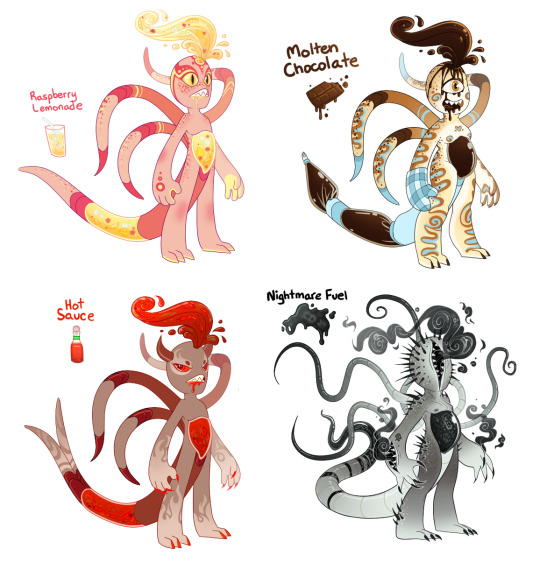
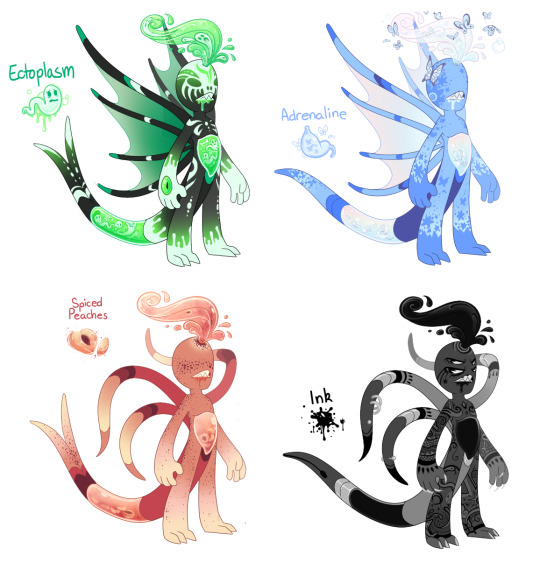

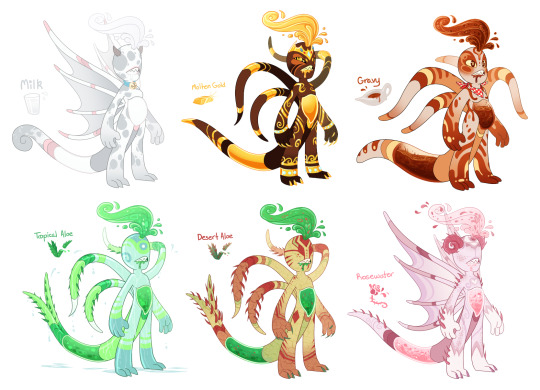
randomly remembered how several years ago i briefly took a crack at the whole "variations of the same template" style of adoptable. i didn't stick with it long for a variety of reasons, but looking back, i still like the critters! i even found the Lore i had come up for them
Converter Creatures
Supernatural creatures that were the result of alchemic experiments to simplify the process of transmuting matter, especially transmuting cheap common materials into more valuable things like gold. However, they evolved beyond the original plan, and are now intelligent and can reproduce on their own, though they are still generally rare to find. While capable of being independent, and many do choose to go rogue and roam 'wild,' they will often gravitate towards the humans that created, raised, or befriended them, or serve as assistants or familiars ((kind of like a talking pokemon, more or less)).
They are capable of eating and digesting almost anything, and, true to their name, whatever they eat is converted into a liquified form of something else. Their stomachs are transparent and fairly elastic, though CCs are not inherently gluttonous ((though like people, they very easily can be, and unscrupulous humans sometimes deliberately rear them up to be if they create valuable substances like gold or silver)).
Depending on the substance the CC creates, it may remain remain a liquid/goo or manifest as a vapor when emitted from their blowhole, or solidify upon prolonged exposure to air. Sometimes "crystals" form in their stomachs, in the loosest sense of the term, in that small fragments or items related to the converted substance accumulate in their gut over time. A CC that creates seawater, for example, may form 'crystals' of sand or sea shells and a CC that creates green apple jam may form slices of or whole apples inside them.
The substances created by CCs sometimes have unique properties that mundane versions of the substances would not have. Aloe gel created by the appropriate CC would more actively heal burns when applied, instead of only mildly soothing them.
CCs tend to be fairly small, rarely growing over 4' or so in height, though this is not an absolute - specimens ranging from a mere 6 inches to eight full feet are known to exist. It's generally advised to keep CCs that produce highly valuable substances, like gold, fairly diminutive, to lessen the chance they'd be exploited.
Most CCs are eyeless, but many have varied eyecounts, as well as differing numbers and formations of tentacles. They can breathe underwater and in high altitude environments, and some are capable of flight. Various other mutations are known as well, and those that create magic substances, like mana or dragonsbreath, have casting powers of their own.
Newly created or newly born Converter Creatures are pale and referred to as 'Empty' until their traits and what form of matter they create develops. What that matter will be can be heavily influenced by the what they are fed during their 'Empty' phase. Feeding them lots of gold in their infancy is a risky investment but can result in an infinite payoff, so long as the source of your sudden wealth is kept secret.
#mog art#old but still worth putting in that stag me thinks#fantasy#imagine feeding your baby abomination like 50 lbs worth of gold coins#hoping to ensure their body adapts and begins generating that#but then they got their paws on One Single Pancake and now you have an infinite supply of syrup instead
89 notes
·
View notes
Text
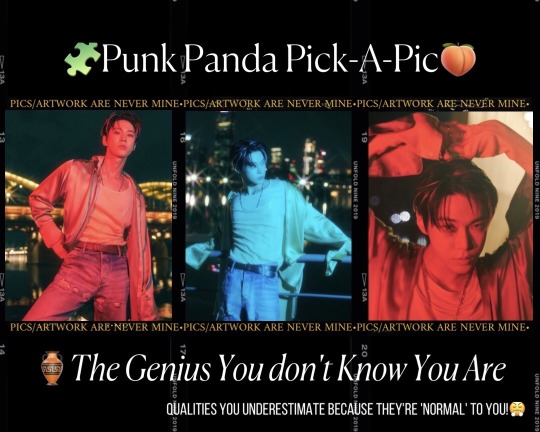
You’re allowed to be savage🚀and fly high🛰
[Back to Masterlist]
Pile 1 - An Evil Genius(?)
X The Wheel of Fortune, 5 of Wands
Priestess of Good Fortune & Gold Magus (Johannes Faustus)

Are you aware that you're a master manifester? Even if you aren't aware of this yourself (maybe for now), you're powerful beyond belief. Literally, with just the power of your mind, you can turn any situation around to be in your favour.
It's just sometimes you aren't confident enough in yourself because there's a lot of doubt in your mind. Either that, or you're often too caught up in the tiny details of how things should be done that you don't get things done at all...
Aaand... maybe that's also how you've attracted misfortune rather easily, too.
The title for this Pile doesn't actually mean you're an evil person. But, because of the nature of your goodness, you could be tempted to sabotage your own success. I know that sounds crazy but try to analyse your patterns to understand how your mind tends to want to do things the hard way. See it now?
To some extend, you do this because you feel bad for having things the easy way. This world somehow favours hard work to a point of obsession. You could subconsciously have been dragged into believing that your success will only matter if you've earned it the hard way.
Access full reading + cards on Patreon🌸
☆♪°・. ☆♪°・. ☆♪°・. ☆♪°・. ☆♪°・. ☆♪°・.
Pile 2 - A Charming Inspiration
4 of Cups Rx, 6 of Wands
Priestess of Energy & Silver Astronomer (Galileo Galilei)

You are a charming social butterfly. Even if you don't see this of yourself, others do see you this way and admire the positive vibe you emanate everywhere you go. You generally have a great energy and people look up to you a lot because your confidence makes them feel motivated. Maybe people just don't tell you enough that you make them feel this way?
Meanwhile, you also have this intellect that pierces through the core of things, so it's quite rare for you to get stuck in a rut for long. You're smart, brave, and positive. Maybe you don't see this as something extraordinarily amazing, but once you understand that not that many people have this insane combination of positivity, you'll appreciate yourself a bit more.
You do have a dualistic nature though. So maybe this is one reason you don't (sometimes) think too highly of yourself. You're sharply analytical to begin with and can be your own harshest critic. You're more aware of what's lacking in you and you think you need to improve yourself all the time.
Of course, you do that because you have a good heart. You want to be better so as to be more liked or more useful to the people around you. But the thing is, you're already an inspiration to so many people by just being yourself.
Access full reading + cards on Patreon🌸
☆♪°・. ☆♪°・. ☆♪°・. ☆♪°・. ☆♪°・. ☆♪°・.
Pile 3 - An Alien, Quite Literally
King of Cups, 2 of Wands
Priestess of Integrity & Red Astronomer (Johannes Kepler)

You're a master at controlling your emotions. You're almost hardheadedly logical and analytical. The way your mind works is like a science project. You're constantly experimenting with trials and errors. Always growing and expanding in your own eccentric ways. You can't be tamed. You're wild because you know your genius.
Flaunt that and don't ever abide by common rules, honey. Don't let them confuse you nor make you doubt yourself. Your uniqueness (in all ways) could literally change the world—if that's one of your interests. You're setting an example for others who are struggling with believing themselves! You're like a wayshower without even meaning to; you're just being you and doing your things—because that's what you do.
Actually, you aren't particularly concerned with the state of the world. You like your own world, after all. Whether inner or outer, you have a world of your own creation that's a million times better than this world. You may not realise how awesome this is of you. Not that many people dare to actually dream the things you dream about all the time. You can make them a reality, of course. If you want to.
That's the thing with geniuses, you decide for yourself what you ultimately want to do. Depends on how interested you are in the cause/project/whatever. In that way, you are powerful. But you're also constantly searching for meaning. This world looks so little to you and feeling restricted is no new friend.
Access full reading + cards on Patreon🌸
☆♪°・. ☆♪°・. ☆♪°・. ☆♪°・. ☆♪°・. ☆♪°・.
Feel free to support me on Patreon if you love this kind of content🍑I create stories and tarot readings that calm the mind & heal from within🍒
[Back to Masterlist]
#Punk Panda Pick A Pic#pac#tarot pac#tarot pick a card#pick a card reading#pick a pile#pick a card#kpop tarot#kpop astrology#kpop aesthetic#nct#nct 127#nct u#nct doyoung#kim doyoung#tarot witch#pagan witch#witchcore#witch aesthetic#witchythings#witchyvibes#witchblr#spirituality#spiritual growth#spiritual healing#spiritual guidance#spiritual awakening#genius#brilliant#aquarius
277 notes
·
View notes
Text
Romance in MXTX, Priest, and SHL
MXTX: Flower, Wine and Dreamworld
The romance in MXTX's works is like flower that grows in ice and snow; colorful, bright and hopelessly romantic, blossoms in misery and hardships.
It features a distinct "us against the world" mindset, depicting love as the only constant in the world. It's an eternal "dreamworld" detached from worldly matters, the perfect escapism as well as a source of strengths in the face of cruel reality.
Both MDZS and TGCF are a critique of mob mentality.
The contrast between CQL and MDZS is very interesting. While the former ends with LWJ taking charge, and therefore changing the world for the better, the novel ends with wangxian isolating themselves from grand politics and focusing more on helping individuals as recluse. It has an essentially pessimistic attitude towards the morality & intelligence of the collective.
TGCF takes a slightly more optimistic approach, featuring the crowd being courageous under the right circumstances. However, both works share a similar undertone: putting one’s absolute faith in the collective is dangerous, whereas unconditional trust and devotion can be only found in one-to-one connection
MXTX herself compares MDZS and TGCF to 花间一壶酒 (A cup of wine among flowers), MDZS being the wine and TGCF being flower. She also compares MDZS to 风雪夜归人, the person returning home from snow and wind, and TGCF to 红泥小火炉, a small red furnace.
Priest: Breezing Wind and Burning Iron
The romance in priest's works is more complicated. It's the most gentle in its normal state, when it is rational and collected, in which case it's like the breezing wind, soothing, sweet and light-hearted. It gives the individuals more incentive to achieve their individual and/or societal vision, as well as more reason to value their own lives & well-being.
In Faraway Wanderers, the most distinct feature of WenZhou relationship is how in naturally sync they are, and how comfortable & smooth their dynamic is. They both have past burden, but it doesn’t matter, because they bring simple joy, understanding and happiness in each other’s lives.
In Sha Po Lang and The Guardian, the ML’s lingering love for the MC motivates them to become better version of themselves, to care about others, and to form a holistic vision about bettering society.
In The Defective, Lin Jingheng(MC) explicitly said that Lu Bixing(ML) is the only meaning in his life. He had little incentive to care about his own life after his revenge plan fell apart. LBX helped him reconnect with his inner idealism, and gave him a reason value his life.
When the passion and fiery energy manifests itself, however, the romance is like burning iron, blood and fire. It isn’t actually toxic or unhealthy, but it's not pure and innocent either; in this case, it strives for something deeper and more intense, never content with the past or the present. The sheer intensity of relationship is like a double-edged sword, walking the fine line between unconditional devotion and dangerous obsession.
SHL: Spring Water and Healing Open Wounds
The romance in SHL is like "spring water"; it's warm, gentle, nurturing. It breaks through the boundary between individuals to bring the couple closer to each other, taking them back to a utopia of their childhood dream, away from social pressure and responsibility. The theme central to their relationship is “salvation”: how love is able to bring people back to integrity.
Both drama wkx and drama zzs have lots of regret about their past sins and wrongdoings. Four Seasons Manor is essentially a metaphor for purity, acceptance and the safety of childhood home. How to make drama wkx open up and accept this safe harbor as his home is one of the most significant plot-lines of the show.
SHL couple is way more emotionally vulnerable and expressive. A significant part of SHL arc is healing the wounds in an open and honest way. They cuddle and confide in each other way more often, talk about their shameful past and even cry about their regrets in front of one another, which is very rare among MXTX/Priest works.
The heat of the relationship sometimes gets too hot and even burns; in other words, there are constant miscommunications, conflicts and misunderstandings in the relationship. However, they can never let each other go, because it's the only source of warmth left for them in their hopeless lives filled with regrets and guilt.
Similarities and Differences
*Note that this is not a SHL/TYK comparison. TYK is kind of an “unorthodox” priest novel; you will know what I mean if you have read 3+ of her works.
Relationship Dynamic & Narrative:
In MXTX’s works, the concept of “romance” itself is divined; and the characters are illustration of the ideal of “undying love”. People are made for one another, to complete one another. Her works use colorful symbolism (silver butterflies, the emperor’s smile, the 3 thousand lanterns, etc.) to depict this romanticized ideal of love.
For MXTX, the romanticization of “destined love” is one of the most recurring themes of her novels. Therefore, the readers look at their relationship through rose-color glasses. Obsession is usually framed in a jolly & romantic light, and doesn’t feature much tension or stress, and has less negative or unhealthy undertone.
In most of priest’s works and SHL, soulmates are not born but made, so they have to figure out how their relationship works step by step. Therefore the narrative is less of a “rosy picture”.
Priest has a habit of using derogatory terms to describe relationships that are mostly healthy, but somewhat “bloody” and edgy, full of excessive passion and obsession. The most common phrase is “爱生忧怖”, a Buddhist term meaning “love results in worry and fear”.
SHL obviously has to be more subtle in expressing love. That said, drama WenZhou are way more emotionally vulnerable and expressive than their novel counterparts, as well as most Priest & MXTX characters. They have a dramatic falling out once in a while, even towards the end. They barely fit the Chinese definition of Zhiji (to know me/to understand one another), but are “lovers” who are buried deep in their passion instead.
Past, Future and Evolvement:
In SHL, characters are encouraged to treasure past impressions that are thrown in figurative “wrappings”, whose luster is derived from age-old experiences (Psychological Types, Carl Jung). In other words, they are encouraged to root their love in a shared past, a Utopia of innocence.
The contrast between The Defective and Word of Honor is very interesting to observe. Both involve long separation, and the suffering and personality changes hat comes from it.
SHL narrative frames their innocent childhood as something to cling to and return to. Drama WKX is encouraged to accept his identity as Four Seasons Manor disciple because it was part of his childhood past. This is a significant part of drama WenZhou relationship.
In The Defective, the narrative doesn't encourage the couple to dwell on the past that much.
On the contrary, the all-knowing AI explicitly discouraged the MC from “comparing past to present”. They are advised to accept changes, however painful it might be, and build a better, more equal dynamic out of it, evolving from one-sided pandering to fighting side-by-side.
In Priest’s novels, the characters rarely return to something in the past, but look into the future. Change is usually framed as inherently beneficial, albeit usually painful and rocky, the implication being that you need to constantly strive for something better.
Sha Po Lang is a good example of this, with Gu Yun’s changing attitude towards Chang Geng after he as he matures, gradually showing his intelligence in politics. CG starts referring to GY as Zixi instead of YiFu is also a sign of this change---to see him as equal rather than a parental figure & protector.
The Defective is even more obvious in this regard, with both parties uncomfortable with the change initially, but gradually adjusting to the changes during their 16-year separation. The ML also stops calling MC by his surname “Lin”, as a sign of viewing him as equal.
In MXTX’s works, change in personality or relationship dynamic is neither framed as painful or good. It just happens. It’s a natural flow that take place when it does. Their relationships are rarely challenged by change. They are objectively at a better place compared to their past, but it’s merely the result of a series of events rather than a deliberate choice or struggle.
WangXian’s relationship naturally changes over time after WWX’s rebirth, but neither of them really struggles with the change.
Xie Lian doesn’t even recognize Hua Cheng as the someone from his past, so they start out as friends getting to know each other.
Salvation and Changing one another:
Priest herself stated in an interview that she doesn’t believe in the concept of salvation, since people have the inner capacity to be their own savior. Therefore, priest characters usually don’t actively try to change their partner’s morals or personality. Some might be willingly influenced by their partner, but there’s rarely an element of moral condemnation. Even when there is a conflict between different values, the options are 1) to reconcile them by choosing the middle ground 2) to maintain their independence and tackle it with nuance 3) to break up.
On surface level, Mo Du/Silent Reading is about Luo Wenzhou being Fei Du’s salvation. However, as LWZ pointed out himself, Fei Du would’ve been a good person at heart with or without his influence.
In The Defective, when Lu Bixing mistakenly thought Lin Jingheng stayed in the Eighth Galaxy against his own wishes because of their relationship, and that their priorities are irreconcilable, he even thought about breaking up. Of course he was not serious about it, but this showcased that he would never try to change LJH’s convictions.
In SHL, however, the concept of salvation is central to the theme. Some find it strange that SHL make drama zzs the more “moral” one of the two, despite his action being more objectively questionable. In fact, the only reason he get framed as more “moral” is that he admitted his fault sooner, and therefore could guide drama wkx’s path back to salvation: to recognize the goodness in people, make peace with external world, to clear his name in Jianghu, and to follow due process with his revenge plan to avoid collateral damages.
“I tried to change you, but you end up changing me”, said drama ZZS. This relationship dynamic is never present in any of priest’s works I’ve read. Priest characters don’t *try* to change one another.
Does MXTX believe in salvation? Hard to tell. One could argue that Hua Cheng would have be way more amoral and even immoral if it hadn’t been for XL. This is complicated and is a topic for another time.
However, it is certain that MXTX MCs don’t condemn each other morally. “The orthodox one defending their unorthodox partner in front of the world” is a common wuxia trope, but the way MXTX novels approach it is very different from SHL.
HuaLian never had a serious falling out about being on different sides. Even when they disagree, they respect each other and love each other exactly the way they are. Hua Cheng didn’t approve of Xie Lian saving Mu Qing, but he didn’t interfere with Xie Lian’s decision. Xie Lian feels responsible for helping Shi Qingxuan in Blackwater arc, but he is perfectly fine with HC helping He Xuan keep secrets. In several cases where they have different values, they are able to make it work with ease.
LWJ never *morally* condemned WWX for his action, and never once objected to WWX practicing demonic cultivation after his rebirth. In fact, LWJ never objected to WWX’s morals; in their previous life he was worried about his safety, and struggled with what to do about certain situations due to his family background, but difference in morality is not an issue for them.
The “righteous” one does not feel the need to guide their unorthodox partner or to be their salvation with regards to integrity.
*The similarity & differences part is a bit messy and some points are not fleshed-out. Sorry about that.
**I don’t claim to have the right interpretation. The lens by which we see different styles of romance is ultimately subjective.
213 notes
·
View notes
Text
Magic is legal, Arthur knows The Truth and Merlin is... shit at explaining things:
Arthur demands a trip to visit the Druids, who are far more qualified than Merlin, so they can explain this whole... destiny thing.
I’ve written a lot of angst and Hurt!Merlin recently, so I just wanted to write something short and sweet and fluffy :)
SO.
Magic has been legalised, Merlin is Court Sorcerer, all the knights are alive and happy, Morgana is good, and the only thing Arthur has to worry about right now is what the hell to do about the rapidly growing crush he has on his BestFriend™.
After the dust had settled, Merlin had tried to sit Arthur down and tell him the whole story; all about Emrys, and the prophecies, and destiny. The King already knew about Merlin’s magic, and roughly how powerful he is, but that’s it.
But Merlin went so long barely mentioning it at all, not even to Gaius or Morgana or Lancelot, that he’s still not entirely sure what to say. Years of hiding and lying and trying desperately not to think about it, mean his brain now blanks when he tries to explain it.
After far too long of Arthur looking on confusedly whilst Merlin rambled on about dragons and coins and mental links and names, The Court Sorcerer gave up, and decided to just not bother.
Arthur, of course, decided that giving up was stupid, and made the executive decision that they would just go to the Druids, and someone who actual knew what they were talking about could explain it thoroughly. Maybe even allow Arthur to read the original prophecies.
Plus, it turned out that Initiating a Golden Age took quite a lot of work, so neither of them had had a chance to leave the city for weeks. They could do with the fresh air. And if Arthur saw it as a good chance to be properly alone with Merlin for more than half a candle mark? No one else needed to know, least of all Merlin.
~
It was a pleasant journey through the woods. The silences comfortable, and the conversations easy and filled with smiles.
Magic had only been legalised for about a fortnight, and after over twenty years of fear, magic users were still understandably cautious, meaning the closest Druid camp was still a two days ride away.
But that wasn’t a problem. With Merlin now able to use his magic openly, and therefor more able to defend his King, he found he was far less anxious about the trip outside the city than he would’ve been before. And if his good mood bled into the environment around them? Well... it was spring... surely no one would notice the extra flowers and abundance of butterflies?
(Arthur definitely noticed. But Merlin was still... wary, of performing sorcery openly, in fear of scaring the people who had been sucked in by two decades of propaganda and fear-mongering. Meaning Arthur sure as shit wasn’t going to point it out, in case Merlin stopped.)
It was around noon, and the sun was shining down on them when Merlin pulled his horse to a stop. He dismounts effortlessly, and hands a confused Arthur his reins. At Arthur’s raised eyebrow, Merlin sighs and speaks quietly:
“The camp is about two minutes further on but... the change in the law was only recent, and...-”
He bites his lip and looks away, worrying Arthur slightly, before continuing:
“-well, chainmail and red capes still make them a little nervous. I’ve already warned their leader that we’re coming-”
He taps his temple briefly:
“-but I should go ahead and explain properly.”
Arthur nods in understanding, and gives Merlin a comforting smile:
“I completely understand, Merlin. How long do you want me to wait, or will you come back to get me?”
Merlin returns his smile, before saying:
“Just wait ten minutes then follow me, straight down the path. Bring the horses, there’ll be somewhere to tie them there. You shouldn’t run into any trouble this close to a camp, but you do have a track-record so-”
Merlin laughs at Arthur’s indignant expression, but continues before he can interrupt him:
“-if you do, just yell. We won’t be too far away, we’ll hear you.”
Arthur rolls his eyes fondly and shoos Merlin away. The Warlock laughs as he turns and continues down the path on foot. Just before he disappears behind a large bush, he turns around again, a slightly concerned expression on his face:
“I might look a bit... different? But don’t mention it, they’re quite fond of me... uh... dressing the part.”
Arthur huffs out a laugh before saying:
“I’m sure I won’t forget what you look like in ten minutes, Merlin. Go.”
Merlin hums thoughtfully, and turns back around, disappearing into the trees and leaving Arthur to his thoughts.
After a few moments, he removes his cloak, tucking it into a saddlebag. He also, after only a little hesitation, removes his sword, strapping it to his saddle. It was still visible and easily within reach, but not so threateningly on display at his hip.
He was entering these people’s home, after personally wielding the sharp edge of their persecution for almost a decade; the least he could do was make them as comfortable as possible.
He hadn’t mentioned it to anyone, not even Merlin, but he had a feeling that this meet was going to end up being about more than the prophecies. Peace had been harboured, magic had been legalised, but like Merlin had pointed out, things were still a little tense. This meeting was a way to show the Druids that Arthur meant it, that his whole heart was behind this change. The he was not his father.
Arthur was a little nervous (not that he’d ever admit that), this was important. Not just to him and the kingdom, but to Merlin personally. He had to get this right. One of the only things that Arthur had managed to get out of Merlin, to do with the whole destiny thing, was that it was finished. It was done.
If Arthur messes this up, not only will it ruin the peace they had been working so hard for... then Merlin might leave. He has no reason to stay after-all, he’s done his job. So Arthur has to get this right, has to impress everyone, now more than ever, because if he fails and the Druids all leave Camelot, then Merlin would leave with them.
And that thought was... unbearable.
He counts down the minutes, getting more and more tense. He tried to distract himself by thinking about what Merlin had said, “dressing the part” what does that even mean?
But it doesn’t work. Soon enough his brain is throwing thought after paranoid thought at him, about all the possible ways Merlin could tell Arthur he hated him, and leave forever and ever.
Arthur rubbed his eyes harshly, muttering to himself about how he really should’ve accepted the “relaxing tea” Gaius had offered him before they left. Other than Merlin, the old physician is the only one who ever seems to know what he needs in the moment, Arthur should definitely learn to listen to him more.
He finally reaches zero in his mental countdown, and sighs before standing from where he’d sat on a fallen log. He’d allowed the horses to wander a bit but they were trained to stay close by, so he has no problem gathering their reins again and leading them slowly down the path Merlin had followed.
All Druid camps were different. Some moved around constantly, some stayed fairly still. Some were huge, acres large with hundreds of people, others were small, only ten people or so. Some were occupied by mostly the sick and elderly, others were full of the young and adventurous, and others were family orientated.
And of course it was rare, according to Gaius, that someone would stay in the same camp their whole life. The Druids were a nomadic people, always shifting, drifting, wandering. Following a constantly tugging thread in their hearts, going where nature beckoned them.
According to Merlin, this specific camp was pretty small (around twenty adults) but it was also a fairly familial group, meaning lots of children. And if that didn’t make Arthur nervous (it definitely did) then nothing would.
Arthur didn’t have much experience with children, and definitely had no concept of how to act around them, especially Druid children.
After about a minute of walking, Arthur could hear loud laughter and quiet conversations floating through the trees. He slowed his pace; trying to appear unthreatening and friendly, or to delay the inevitable, he’s not quite sure.
He finally breaks through the treeline to see that... no one is even looking in his direction.
It was the middle of the day, so the camp was busy, people milling about everywhere, most of the tents open, various jobs getting done throughout the clearing.
But what immediately drew Arthur’s eye, was the source of the laughter.
The King looked across the clearing to see Merlin, in a whole new wardrobe, and a whole new light.
The man had changed from his simple travellers clothes (basically the clothes he’d worn as a manservant, just a bit newer and cleaner.) into a loose, white, lace up shirt (sleeves rolled up, which Arthur absolutely did NOT find himself staring at, thank you very much.) paired with slim black trousers.
But what was most striking, was the deep blue cloak billowing behind him, and the silver crown on his head. It was delicate, as if forged with vines and leaves and feathers, but it was oh so Merlin.
Arthur stayed at the edge of the clearing, glad that no one had noticed him; allowing him to stare in reverence at his best friend.
He was surrounded by young children, all laughing joyously as his eyes glowed golden and he waved his hands around. He needn’t mutter spells as he smiled widely, willing butterflies and bees to manifest in the air around him.
One of the younger children held his arms in the air and made grabbing motions with his hands. Merlin bent over and pulled him up into the air without a moment of hesitation, spinning him around on the spot (much to the kid’s enjoyment, who giggled outrageously), before settling him on his hip.
He used one hand to support the kid’s weight (when did Merlin get so strong??), and used the other to summon flowers around the feet of the rest of the children.
A fond smile spread across Arthur’s face as he saw them run around exuberantly, gathering the flowers in chubby hands to present to parents and siblings and friends.
Arthur laughed softly as he saw Merlin reply enthusiastically to something that the boy on his hip had said, and a second later, the child had a butterfly perched on the end of his nose.
Arthur is broken from his concentration, jumping a foot in the air when a soft hand lands on his shoulder from behind.
He whips his head around, just about managing to stop himself from yelping and reaching for where his sword usually is at his hip.
He calms his breathing as his eyes find the friendly face of a Druid, an amused smile on his face. Arthur returns his smile, a tad shakily, suddenly feeling the nerves again, and nods his head respectfully.
The man keeps his hand on Arthur’s shoulder, but looks towards Merlin in the clearing, before softly saying:
“He’s quite something, your Emrys, isn’t he?”
Arthur gulps, also looking back at Merlin as he replies with a chuckle that was only slightly forced:
“He’s more yours than mine, especially like this, but yes, he is something special.”
The Druid laughs disbelievingly, and Arthur turns to look, a confused expression on his face as he listens to his reply:
“Definitely not. He’s always belonged to you more than he’s belonged to us-”
He stops laughing to look at Arthur, eyes sparkling with friendly mirth as he continues:
“-prophecy or no, he had a... well... a pre-carved place among the Druids, but he still chose to carve his own space by your side. I think that speaks volumes about where he truly belongs, or at least where he wants to belong, don’t you?”
Arthur doesn’t really have a response to that as he stares at the man with barely concealed bafflement, but luckily, before the silence stretches too long, the Druid gestures to the clearing:
“Come. Everyone is excited to meet you, though I warn you, the children in this camp can be rather energetic, as you’ve already seen.”
Arthur gulps and nods, following him into the centre of the camp.
Everyone’s attention is quickly caught by The King’s presence, and someone comes over to wordlessly take the horse’s reins from him.
The adults bow their heads slightly in respect, giving him soft smiles, and the children fidget on the spot, wide grins on their faces as they whisper conspiratorially to each other.
The boy in Merlin’s arms wiggles, and he gets put down. He rushes over to Arthur, grabbing his hand with a toothy grin and dragging him over to Merlin and the other children.
Merlin hides a laugh behind his hand as Arthur’s eyes widen, and his face goes pale. He thought this was going to be meetings and serious discussions and apologies, not playing with children!! What do children even like?! Swords?? Can he talk to them about swords??! Druids are pacifists right? So probably not??
He gets pulled down to crouch, and the children crowd him, all babbling at once, wildly showing him flowers and butterflies.
Merlin laughs at his bewildered fear for a few moments, before he crouches next to Arthur and holds his hands up, saying loudly:
“Alright, alright, you lot. Remember what I said?”
The children still, and a chorus of “Yes Lord Emrys” resounds from the group. With that, they stay silent, but still grin widely and bounce on the spot in excitement.
Arthur gives Merlin a stressed, but grateful smile, before looking back to the children. He takes a deep breath, before smiling at them, and saying:
“My name’s Arthur. Thank you for having me, I appreciate your hospitality.”
Merlin snorts at his overly formal tone, and has to stop himself laughing at the shock and fear on Arthur’s face when one of the younger ones loudly asks:
“What’s hosp-ee-tal-it-ee?”
Arthur furrows his brows, but luckily one of the teenagers steps in, quietly saying:
“It’s when someone comes into your home, and you’re nice to them.”
Arthur smiles and nods, and Merlin chuckles in amusement.
Thankfully (for Arthur) Merlin then stands and announces to the children that it’s lunch time, and to get washed up. They all rush off, and Arthur lets out a breath as he stands.
Merlin holds in yet another laugh, but tilts his head in confusion as Arthur’s gaze is once again drawn to the crown that rests on Merlin’s unruly hair.
Merlin flushes slightly when he realises what Arthur is looking at, looking to the floor and mumbling:
“You have no idea how long I’ve been trying to get them to just call me Merlin, but then they presented me with this a few months ago and I could hardly say no, could I?”
Arthur nods as Merlin looks up again, meeting his gaze. There’s a soft smile on his face, one that Merlin isn’t quite sure what to make of as he quietly replies:
“Hmm. Looks good on you.”
Merlin makes a surprised noise and his eyes go wide, the flush on his cheeks deepening as Arthur laughs gently at him.
Arthur puts his hand on Merlin’s shoulder, his thumb brushing against the skin of his neck in a way that was slightly more than friendly, but Merlin doesn’t pull away, so Arthur leaves his hand there as he looks around the bustling camp.
His smile falls into something more sad, and Merlin frowns at him curiously:
“Arthur? What is it?”
Arthur shakes his head slightly, not looking back at Merlin as he replies, almost whispering:
“Nothing. It’s just, last time I was this far into a Druid camp... I did terrible things. Look at this place, how could I ever have believed that magic was evil? It’s beautiful here.”
Merlin’s frown deepens, but before he can reply, a small hand tugs at Arthur’s sleeve, and the two of them look down suddenly to see one of the boys from before. He wore a confused expression, and whispered, as if he knew this was meant to be a secret conversation:
“What terrible things did you do, Mr King Sir?”
Merlin takes in a quiet gasp and widens his eyes, but before he can tell him off or lie, Arthur squeezes his shoulder, and crouches down in front of the child.
Arthur gives the boy a smile, and takes his hands, quietly saying:
“Well. When I was young, I was taught some things that are wrong, I didn’t question them, and because of that I did some really bad things. I thought I was being a good person, but actually I was being a bad person because I didn’t do my own research, and I didn’t know any better. But then I started learning how to be better, and now I do everything in my power to be an actual good person.-”
Arthur looks up at Merlin with a small smile on his face, before looking back down to the boy, who is hanging on to his every word:
“-Your Emrys is helping me with that. You see, he’s the best person I’ve ever met, and he’s helping me be more like him.”
Arthur resists the urge to look back at Merlin as he feels a firm, but shaky hand on his back, and instead looks at the child as he thinks over Arthur’s words. His face breaks into a grin, and Arthur returns the smile as the boy says:
“He’s the best isn’t he? I wanna be like him when I grow up!”
Arthur ruffles his hair, and replies quietly:
“Yeah kid, me too.”
The boy gives him a toothy grin, before running off once again, and Arthur lets out yet another breath he had been holding before standing up.
Merlin’s hand remains on his shoulder, and Arthur regrets meeting his gaze the moment he turns his head. But he also can’t rip his eyes away from the teary expression of awe and bewildered happiness on his face.
Merlin lets out a gentle laugh at Arthur’s apprehensive face before shaking his head, and looking back at him once again, this time amusement on his face:
“The best person you’ve ever met, huh?”
Arthur rolls his eyes and blushes deeply, pushing Merlin’s hand off his shoulder as he mumbles a flustered:
“Shut up, Merlin. I could hardly tell him the truth, could I?”
Merlin hums thoughtfully and replies with laughter in his voice:
“Hmm. That makes more sense, of course.”
Without waiting for Arthur’s reply, he grabs the King’s wrist and drags him towards a large tent in the corner of the clearing. Inside were two tables, one large, and one smaller and lower, both surrounded by benches.
Merlin directed them to bowls in the corner so they could wash their hands, before they sit at the larger of the two tables. Everyone over the ages of about fourteen joins them, the younger ones going to the smaller table.
Food appears, covering the surface, summoned from the cooking pots outside and the various food stores around the camp. Arthur tries to keep the wonderment off his face, but knows he failed miserably when he hears Merlin chuckle beside him. He punches Merlin’s leg under the table playfully, but that only makes him laugh harder.
He quietens when the man sat opposite Arthur stands:
“Today we have two honoured guests, our Lord Emrys, and the Once and Future King Arthur. We share our home, our food, and our welcome, for as long as they wish to stay. We raise our goblets to you, My Lords.”
At that, he raises his cup in the air, everyone else in the tent following him. Merlin smiles and nods at him, raising his own cup, and Arthur nervously copies his movements, comforted by Merlin’s reassuring hand on his knee.
With that, the Druid sits down, and conversation breaks out around the tent as everyone begins to eat.
Merlin handles most of the discussions, talking to everyone as if they were life long friends. Arthur is grateful for that, he answers any questions sent his way, asking a few polite ones in return, but Druid culture is so different to life in the city and Arthur doesn’t really know what he should be talking about.
Thankfully, the meal passes quickly, and after another announcement from the man Arthur now presumed was the leader here, the crowd dispersed, everything being cleared away with magic.
Not every Druid practiced sorcery, but they were clearly in a magic-heavy camp; Arthur could see it plain as day, everywhere he looked.
Merlin once again took Arthur’s wrist, leading him out into the sun. Usually, Arthur hated being led places, especially by the hand, but he found he didn’t quite mind it today. Whether it was because they were in Merlin’s domain, and Merlin was King here, or because of how nervous he was, or because of some other reason entirely, Arthur wasn’t sure, and frankly, he didn’t want to think too deeply about it.
This time, Merlin led them to another, smaller tent.
It had several comfortable looking chairs around a smallish circular table, which was covered in scrolls and parchments and old-looking books.
A few seconds later, they were joined by the Druid leader; he smiled softly at them and gestured for them to sit at the table. Merlin and Arthur sat next to each other, and the Druid kindly pretended not to notice them shuffling the chairs closer together.
The rest of the afternoon passed in a blur, Arthur having lost his nerves fairly early in the conversation. Maybe that had something to do with the fact that official meetings were his specialty, or maybe it was because Merlin’s hand once again found his knee, but stayed there this time. Who knows.
The Druid had introduced himself, and once more welcomed Arthur to the camp, before launching into explanations of the prophecies and destinies, and everyone’s roles in them.
Merlin knew most if it, and looked especially proud of himself when the Druid described in wonder how Merlin had changed the very fates of the Lady Morgana, Sir Mordred, and Arthur himself.
Arthur was definitely taken aback at that. Whilst Merlin had prattled on, making no sense, about his and Arthur’s destinies, he had never mentioned anyone else, and Arthur becomes increasingly glad he came here to sort it all out.
There were some bits that not even Merlin knew though. He wasn’t aware that the other knights, Guinevere, and Gaius featured in a few of the newer prophecies, and the Druid had an amused smile on his face when he admitted that he’d thought Merlin would have figured that out.
Arthur did laugh at him at that, and Merlin flushed before telling him:
“Shut up, or I’ll tell the others you said I was the best person you’ve ever met, and they’ll never let you live it down.”
Arthur narrows his eyes, and the Druid continues look at them in amusement as they bicker.
The meeting comes to an end just before dark, and Arthur thanks the Druid profusely, for welcoming him, and taking the time to go through everything thoroughly.
Another meal is had in the large tent, but when they leave this time, the clearing has been completely emptied. A large bonfire roars in the middle, and logs surround it, providing seating for everyone.
The evening is full of stories and music and magic, and Arthur once again finds himself wondering just how he thought any of this could be evil.
Even Merlin stands to lead a song. He moves around the clearing with yet another child sat sat on his hip, giggling as Merlin spins her around.
Arthur is surprised to learn that Merlin has a good voice, and stares in wonderment as he leads the melody as if it was what he was born to do. The rest of the Druids clap along, joining in loudly and harmonising and playing instruments in time with the tune.
When the song comes to a close, the crowd burst into cheers as Merlin looks back to Arthur, breathing deeply and cheeks flushed. The Warlock smiles widely as he settles the child back in her mother’s lap before walking back over to his seat, next to Arthur.
Arthur returns his wide grin with a soft smile of his own, and as the music continues around them, Merlin tilts his face in happy confusion:
“Why are you looking at me like that?”
Arthur just shakes his head slightly, smiling slightly wider as he responds without missing a beat:
“You’re beautiful like this. And you have an exceptional voice.”
Merlin flushes in surprise and looks to his lap, quietly muttering:
“I wouldn’t know about that...”
Arthur doesn’t look away, huffing out a laugh before replying:
“I mean it, Merlin. You just look... happy. Like you belong here.-”
He does look away here, staring into the fire with a thoughtful, but slightly mournful look on his face as Merlin peers up at him, curious. Arthur continues, even quieter, before Merlin can question him:
“-You know, I wouldn’t be angry if you wanted to stay. Here, I mean. I know magic is legal in Camelot now, but you belong somewhere like this. I would never begrudge you a home like this Merlin.”
Merlin laughs quietly, and takes Arthur’s hand, holding it in his lap like it’s something precious (it is, at least it is to Merlin). Arthur looks back at him in surprise, but doesn’t pull away as Merlin replies, still smiling:
“Home isn’t a place, Arthur, and the Druids know that better than anyone. Home is... home is wherever the people you love are. You are my people, Arthur, you and the knights and Gwen and Morgana and Gaius. My home is wherever you are. No matter my magic or title or destiny; my home will always be where you are.”
Arthur doesn’t let the tears in his eyes fall, but he does squeeze Merlin’s hand, giving him a tender smile that's returned without hesitation.
With the exchanging of smiles that any onlooker would describe as loving, the conversation comes to an easy close, and they spend the rest of the evening hand in hand, smiling fondly at the antics around them.
It’s late when the festivities come to an end, and Arthur and Merlin are exhausted, struggling to hold back yawns as they’re shown to a tent that had been set up for them.
Their bags had been removed from the horses and left in there, and the floor was covered in various blankets and pillows. There was a small trunk, for them to store anything they wished to unpack, and a few candles were lit, filling the room with a soft golden light and pleasant smells.
Merlin charms the tent to be soundproof so they don’t have to worry about noise (he may be openly able to use magic, but the idiot was still rather clumsy, and prone to accidental bangs and crashes), before removing his crown carefully. His cloak and boots follow shortly, and they all go neatly into the trunk, before he starts organising a spot to sleep.
After a few minutes, he realises that Arthur hasn’t moved from his space by the entrance, and Merlin turns around to look at him questioningly. Arthur’s eyebrows are furrowed, and he looks deep in thought as he stares at the floor, fiddling with the hem of his tunic.
Merlin walks over, concerned, and takes one of Arthur’s hands into his own. Arthur looks up at him suddenly, broken free of his thoughts, and Merlin raises an eyebrow at him as he strokes his thumb across The King’s knuckles:
“What’s wrong, Arthur?”
Arthur looks into Merlin’s eyes searchingly, but seems to find what he’s looking for after only a moment, and smiles. Merlin tilts his head to prompt him, and Arthur takes his other hand, before softly speaking:
“You know, I used to find the idea of falling in love frightening.-”
Merlin takes in a subtle deep breath, but Arthur doesn’t notice as he shakes his head, huffing out a gentle laugh before continuing, looking somewhere over Merlin’s shoulder:
“-The possibility that someone could have that much control over me; that I would willingly give another person dominion over my heart, my soul, my... everything, was terrifying to me. But I find I’m not scared anymore.-”
He looks back at Merlin’s shocked face. Arthur looks an odd mix of disbelieving, and happy beyond words as he continues, confident that what he’s saying is right, for the first time in a long time:
“-Because it’s you, Merlin. It’s always been you. And how could I possibly find falling in love with you anything other than beautiful?”
Merlin gulps, seemingly searching Arthur’s face for any hint of a lie. When he finds nothing but sincerity, he launches himself forward, almost knocking Arthur to the floor.
He wraps his arms around the blonde’s shoulders tightly, burying a hand in his hair, and his face in the crook of his neck. Arthur huffs out a laugh as he wraps his arms around Merlin’s waist, running a soft hand up and down his back.
At Merlin’s muttered:
“I love you, Arthur, more than anything is this world. My magic, my everything, belongs to you.”
Arthur pulls back, smiling. He leans forward pressing his forehead against Merlin’s, and cups his cheek softly with his hand. They stare into the blue of each other’s eyes for a moment, not in any hurry to move the moment along, Arthur running his thumb over Merlin’s cheekbone, and Merlin carding his fingers through Arthur’s hair.
Arthur takes a deep breath, before whispering, so quietly it’s a miracle Merlin hears him:
“Can I kiss you?”
Merlin nods infinitesimally, and the two of them lean forward, meeting in the middle in a soft kiss that could only be described as tender, and full of love.
If the stars shine brighter, and the wind blows warmer, and the animals of the dark seem happier that night... well... it was spring... surely no one would notice (Arthur definitely noticed, but he sure as shit wasn’t going to point it out, in case Merlin stopped).
~
THE END!!
This is the first one I’ve written in aaaaages that didn’t involve a dizzy/exhausted/sick Merlin so... yay me?
I just really wanted to write something fluffy, where there were no high stakes. No huge battles, or angsty confessions or anything like that, just a soft love story.
I genuinely got no clue what I’ll write next. I do have a few drafts and ideas floating around, but let me know if you’re after anything specific, I live to please :)
Like always, you wanna write this up properly with paragraphs and fleshed out stuff, go for it, credit and tag me :)
#merthur#bbc merlin#merlin#merlin/arthur#merthur fluff#ultra fluff#post magic reveal#court sorcerer merlin#good morgana#good mordred#gwen#guinevere#morgana#mordred#leon#sir leon#lancelot#sir lancelot#gwaine#sir gwaine#sir percival#percival#sir elyan#elyan#king arthur#arthur pendragon#druids#druid#emrys#merlin emrys
757 notes
·
View notes
Text
Pagan Paths: Wicca
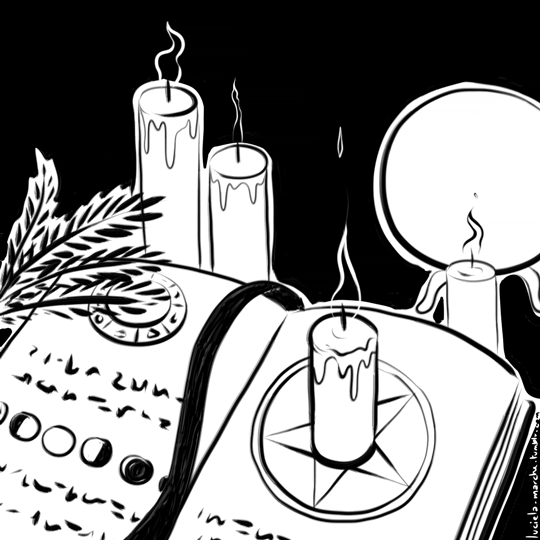
Wicca is the big granddaddy of neopagan religions. Most people who are familiar with modern paganism are specifically familiar with Wicca, and will probably assume that you are Wiccan if you tell them you identify as pagan. Thanks to pop culture and a handful of influential authors, Wicca has become the public face of modern paganism, for better or for worse.
Wicca is also one of the most accessible pagan religions, which is why I chose to begin our exploration of individual paths here. Known for its flexibility and openness, Wicca is about as beginner-friendly as it gets. While it definitely isn’t for everyone, it can be an excellent place to begin your pagan journey if you resonate with core Wiccan beliefs.
This post is not meant to be a complete introduction to Wicca. Instead, my goal here is to give you a taste of what Wiccans believe and do, so you can decide for yourself if further research would be worth your time. In that spirit, I provide book recommendations at the end of this post.
History and Background
Wicca was founded by Gerald Gardner, a British civil servant who developed an interest in the esoteric while living and working in Asia. Gardner claimed that, after returning to England, he was initiated into a coven of witches who taught him their craft. Eventually, he would leave this coven and start his own, at which point he began the work of bringing Wicca to the general public. In 1954, Garner published his book Witchcraft Today, which would have a great impact on the formation of Wicca, as would his 1959 book The Meaning of Witchcraft.
Gardner claimed that the rituals and teachings he received from his coven were incomplete — he attempted to fill in the gaps, which resulted in the creation of Wicca. Author Thea Sabin calls Wicca “a New Old Religion,” which is a good way to think about it. When Gardner wrote the first Wiccan Book of Shadows, he combined ancient and medieval folk practices from the British Isles with ceremonial magic dating back to the Renaissance and with Victorian occultism. These influences combined to create a thoroughly modern religion.
Wicca spread to the United States in the 1960s, at which time several new and completely American traditions were born. Some of these traditions are simply variations on Wicca, while others (like Feri and Reclaiming, which we’ll discuss in future posts) became unique, full-fledged spiritual systems in their own right. In America, Wicca collided with the counter-culture movement, and several activist groups began to combine the two. Wicca has continued to evolve through the decades, and is still changing and growing today.
There are two main “types” of Wicca which take very different approaches to the same deities and core concepts.
Traditional Wicca is Wicca that looks more or less like the practices of Gerald Gardner, Doreen Valiente, Alex Sanders, and other early Wiccan pioneers. Traditional Wiccans practice in ritual groups called covens. Rituals are typically highly formal and borrow heavily from ceremonial magic. Traditional Wicca is an initiatory tradition, which means that new members must be trained and formally inducted into the coven by existing members. This means that if you are interested in Traditional Wicca, you must find a coven or a mentor to train and initiate you. However, most covens do not place any limitations on who can join and be initiated, aside from being willing to learn.
Most Traditional Wiccan covens require initiates to swear an oath of secrecy, which keeps the coven’s central practices from being revealed to outsiders. However, there are traditional Wiccans who have gone public with their practice, such as the authors Janet and Stewart Farrar.
Eclectic Wicca is a solitary, non-initiatory form of Wicca, as made popular by author Scott Cunningham in his book Wicca: A Guide for the Solitary Practitioner. Eclectic Wiccans are self-initiated and may practice alone or with a coven, though coven work will likely be less central in their practice. There are very few rules in Eclectic Wicca, and Wiccans who follow this path often incorporate elements from other spiritual traditions, such as historical pagan religions or modern energy healing. Because of this, there are a wide range of practices that fall under the “Eclectic Wicca” umbrella. Really, this label refers to anyone who considers themselves Wiccan, follows the Wiccan Rede (see below), and does not belong to a Traditional Wiccan coven. The majority of people who self-identify as Wiccan fall into this group.
Core Beliefs and Values
Thea Sabin says in her book Wicca For Beginners that Wicca is a religion with a lot of theology (study and discussion of the nature of the divine) and no dogma (rules imposed by religious structures). As a religion, it offers a lot of room for independence and exploration. This can be incredibly empowering to Wiccans, but it does mean that it’s kind of hard to make a list of things all Wiccans believe or do. However, we can look at some basic concepts that show up in some form in most Wiccan practices.
Virtually all Wiccans live by the Wiccan Rede. This moral statement, originally coined by Doreen Valiente, is often summarized with the phrase, “An’ it harm none, do what ye will.”
Different Wiccans interpret the Rede in slightly different ways. Most can agree on the “harm none” part. Wiccans strive not to cause unnecessary harm or discomfort to any living thing, including themselves. Some Wiccans also interpet the word “will” to be connected to our spiritual drive, the part of us that is constantly reaching for our higher purpose. When interpreted this way, the Rede not only encourages us not to cause harm, but also to live in alignment with our own divine Will.
Wiccans experience the divine as polarity. Wiccans believe that the all-encompassing divinity splits itself (or humans split it into) smaller aspects that we can relate to. The first division of deity is into complimentary opposites: positive and negative, light and dark, life and death, etc. These forces are not antagonistic, but are two halves of a harmonious whole. In Wicca, this polarity is usually embodied by the pairing of the God and Goddess (see below).
Wiccans experience the divine as immanent in daily life. In the words of author Deborah Lipp, “the sacredness of the human being is essential to Wicca.” Wiccans see the divine present in all people and all things. The idea that sacred energy infuses everything in existence is a fundamental part of the Wiccan worldview.
Wiccans believe nature is sacred. In the Wiccan worldview, the earth is a physical manifestation of the divine, particularly the Goddess. By attuning with nature and living in harmony with its cycles, Wiccans attune themselves with the divine. This means that taking care of nature is an important spiritual task for many Wiccans.
Wiccans accept that magic is real and can be used as a ritual tool. Not all Wiccans do magic, but all Wiccans accept that magic exists. For many covens and solitary practitioners, magic is an essential part of religious ritual. For others, magic is a practice that can be used not only to connect with the gods, but also to improve our lives and achieve our goals.
Many Wiccans believe in reincarnation, and some may incorporate past life recall into their spiritual practice. Some Wiccans believe that our souls are made of cosmic energy, which is recycled into a new soul after our deaths. Others believe that our soul survives intact from one lifetime to the next. Many famous Wiccan authors have written about their past lives and how reconnecting with those lives informed their practice.
Important Deities and Spirits
The central deities of Wicca are the Goddess and the God. They are two halves of a greater whole, and are only two of countless possible manifestations of the all-encompassing divine. The God and Goddess are lovers, and all things are born from their union.
Though some Wiccan traditions place a greater emphasis on the Goddess than on the God, the balance between these two expressions of the divine plays an important role in all Wiccan practices (remember, polarity is one of the core values of this religion).
The Goddess is the Divine Mother. She is the source of all life and fertility. She gives birth to all things, yet she is also the one who receives us when we die. Although she forms a duality in her relationship with the God, she also contains the duality of life and death within herself. While the God’s nature is ever-changing, the Goddess is constant and eternal.
The Goddess is strongly associated with both the moon and the earth. As the Earth Mother, she is especially associated with fertility, abundance, and nurturing. As the Moon Goddess, she is associated with wisdom, secret knowledge, and the cycle of life and death.
Some Wiccans see the goddess as having three main aspects: the Maiden, the Mother, and the Crone. The Maiden is associated with youth, innocence, and new beginnings; she is the embodiment of both the springtime and the waxing moon. The Mother is associated with parenthood and birth (duh), abundance, and fertility; she is the embodiment of the summer (and sometimes fall) and of the full moon. The Crone is associated with death, endings, and wisdom; she is the embodiment of winter and of the waning moon. Some Wiccans believe this Triple Goddess model is an oversimplification, or complain that it is based on outdated views on womanhood, but for others it is the backbone of their practice.
Symbols that are traditionally used to represent the Goddess include a crescent moon or an image of the triple moon (a full moon situated between a waxing and a waning crescent), a cup or chalice, a cauldron, the color silver, and fresh flowers.
The God is the Goddess’s son, lover, and consort. He is equal parts wise and feral, gentle and fierce. He is associated with sex and by extension with potential (it could be said that while the Goddess rules birth, the God rules conception), as well as with the abundance of the harvest. He is the spark of life, which is shaped by the Goddess into all that is.
The God is strongly associated with animals, and he is often depicted with horns to show his association with all things wild. As the Horned God he is especially wild and fierce.
The God is also strongly associated with the sun. As a solar god he is associated with the agricultural year, from the planting and germination to the harvest. While the Goddess is constant, the God’s nature changes with the seasons.
In some Wiccan traditions, the God is associated with plant growth. He may be honored as the Green Man, a being which represents the growth of spring and summer. This vegetation deity walks the forests and fields, with vines and leaves sprouting from his body.
Symbols that are traditionally used to represent the God include phalluses and phallic objects, knives and swords, the color gold, horns and antlers, and ripened grain.
Many covens, both Traditional and Eclectic, have their own unique lore around the God and the Goddess. Usually, this lore is oathbound, meaning it cannot be shared with those outside the group.
Many Wiccans worship other deities besides the God and Goddess. These deities may come from historical pantheons, such as the Greek or Irish pantheon. A Wiccan may work with the God and Goddess with their coven or on special holy days (see below), but work with other deities that are more closely connected to their life and experiences on a daily basis. Wiccans view all deities from all religions and cultures as extensions of the same all-encompassing divine force.
Wiccan Practice
Most Wiccans use the circle as the basis for their rituals. This ritual structure forms a liminal space between the physical and spiritual worlds, and the Wiccan who created the circle can choose what beings or energies are allowed to enter it. The circle also serves the purpose of keeping the energy raised in ritual contained until the Wiccan is ready to release it. Casting a circle is fairly easy and can be done by anyone — simply walk in a clockwise circle around your ritual space, laying down an energetic barrier. Some Wiccans use the circle in every magical or spiritual working, while others only use it when honoring the gods or performing sacred rites.
While it is on one level a practical ritual tool, the circle is also a representation of the Wiccan worldview. Circles are typically cast by calling the four quarters (the four compass points of the cardinal directions), which are associated with the four classical elements: water, earth, fire, and air. Some (but not all) Wiccans also work with a fifth element, called spirit or aether. The combined presence of the elements makes the circle a microcosm of the universe.
Casting a circle requires the Wiccan to attune themselves to these elements and to honor them in a ritual setting. This is referred to as calling the quarters. When a Wiccan calls the quarters, they will move from one cardinal point to the next (usually starting with east or north), greet the spirits associated with that direction/element, and invite them to participate in the ritual. (If spirit/aether is being called, the direction it is associated with is directly up, towards the heavens.) This is done after casting the circle, but before beginning the ritual.
What happens within a Wiccan ritual varies a lot — it depends on the Wiccan, their preferences, and their goals for that ritual. However, nearly all Wiccan religious rites begin with the casting of the circle and calling of the quarters. (Some would argue that a ritual that doesn’t include these elements cannot be called Wiccan.)
When the ritual is completed, the quarters must be dismissed and the circle taken down. Wiccans typically dismiss the quarters by moving from one cardinal point to the next (often in the reverse of the order used to call the quarters), thanking the spirits of that quarter, and politely letting them know that the ritual is over. The circle is taken down (or “taken up,” as it is called in some traditions) in a similar way, with the person who cast the circle moving around it counterclockwise and removing the energetic barrier they created. This effectively ends the ritual.
There are eight main holy days in Wicca, called the sabbats. These celebrations, based on Germanic and Celtic pagan festivals, mark the turning points on the Wheel of the Year, i.e., the cycle of the seasons. By honoring the sabbats, Wiccans attune themselves with the natural rhythms of the earth and actively participate in the turning of the wheel.
The sabbats include:
Samhain (October 31): Considered by many to be the “witch’s new year,” this Celtic fire festival has historic ties to Halloween. Samhain is primarily dedicated to the dead. During this time of year, the otherworld is close at hand, and Wiccans can easily connect with their loved ones who have passed on. Wiccans might celebrate Samhain by building an ancestor altar or holding a feast with an extra plate for the dead. Samhain is the third of the three Wiccan harvest festivals, and it is a joyous occasion despite its association with death. (By the way, this sabbat’s name is pronounced “SOW-en,” not “Sam-HANE” as it appears in many movies and TV shows.)
Yule/Winter Solstice (December 21): Yule is a celebration of the return of light and life on the longest night of the year. Many Wiccans recognize Yule as the symbolic rebirth of the God, heralding the new plant and animal life soon to follow. Yule celebrations are based on Germanic traditions and have a lot in common with modern Christmas celebrations. Wiccans might celebrate Yule by decorating a Yule tree, lighting lots of candles or a Yule log, or exchanging gifts.
Imbolc (February 1): This sabbat, based on an Irish festival, is a celebration of the first stirrings of life beneath the blanket of winter. The spark of light that returned to the world at Yule is beginning to grow. Imcolc is a fire festival, and is often celebrated with the lighting of candles and lanterns. Wiccans may also perform ritual cleansings at this time of year, as purification is another theme of this festival.
Ostara/Spring Equinox (March 21): Ostara is a joyful celebration of the new life of spring, with ties to the Christian celebration of Easter. Plants are beginning to bloom, baby animals are being born, and the God is growing in power. Wiccans might celebrate Ostara by dying eggs or decorating their homes and altars with fresh flowers. In some covens, Ostara celebrations have a special focus on children, and so may be less solemn than other sabbats.
Beltane (May 1): Beltane is a fertility festival, pure and simple. Many Wiccans celebrate the sexual union of the God and Goddess, and the resulting abundance, at this sabbat. This is also one of the Celtic fire festivals, and is often celebrated with bonfires if the weather permits. The fae are said to be especially active at Beltane. Wiccans might celebrate Beltane by making and dancing around a Maypole, honoring the fae, or celebrating a night of R-rated fun with friends and lovers.
Litha/Midsummer/Summer Solstice (June 21): At the Summer Solstice, the God is at the height of his power and the Goddess is said to be pregnant with the harvest. Like Beltane, Midsummer is sometimes celebrated with bonfires and is said to be a time when the fae are especially active. Many Wiccans celebrate Litha as a solar festival, with a special focus on the God as the Sun.
Lughnasadh/Lammas (August 1): Lughnasadh (pronounced “loo-NAW-suh”) is an Irish harvest festival, named after the god Lugh. In Wicca, Lughnasadh/Lammas is a time to give thanks for the bounty of the earth. Lammas comes from “loaf mass,” and hints at this festival’s association with grain and bread. Wiccans might celebrate Lughnasadh by baking bread or by playing games or competitive sports (activities associated with Lugh).
Mabon/Fall Equinox (September 21): Mabon is the second Wiccan harvest festival, sometimes called “Wiccan Thanksgiving,” which should give you a good idea of what Mabon celebrations look like. This is a celebration of the abundance of the harvest, but tinged with the knowledge that winter is coming. Some Wiccans honor the symbolic death of the God at Mabon (others believe this takes place at Samhain or Lughnasadh). Wiccan Mabon celebrations often include a lot of food, and have a focus on giving thanks for the previous year.
Aside from the sabbats, some Wiccans also celebrate esbats, rituals honoring the full moons. Wiccan authors Janet and Stewart Farrar wrote that, while sabbats are public festivals to be celebrated with the coven, esbats are more private and personal. Because of this, esbat celebrations are typically solitary and vary a lot from one Wiccan to the next.
Further Reading
If you want to investigate Wicca further, there are a few books I recommend depending on which approach to Wicca you feel most drawn to. No matter which approach you are most attracted to, I recommend starting with Wicca For Beginners by Thea Sabin. This is an excellent introduction to Wiccan theology and practice, whether you want to practice alone or with a coven.
If you are interested in Traditional Wicca, I recommend checking out A Witches’ Bible by Janet and Stewart Farrar after you finish Sabin’s book. Full disclosure: I have a lot of issues with this book. Parts of it were written as far back as the 1970s, and it really hasn’t aged well in terms of politics or social issues. However, it is the most detailed guide to Traditional Wicca I have found, so I recommend it for that reason. Afterwards, I recommend reading Casting a Queer Circle by Thista Minai, which presents a system similar to Traditional Wicca with less emphasis on binary gender. After you learn the basics from the Farrars, Minai’s book can help you figure out how to adjust the Traditional Wiccan system to work for you.
If you are interested in Eclectic Wicca, I recommend Wicca: A Guide for the Solitary Practitioner and Living Wicca by Scott Cunningham. Cunningham is the author who popularized Eclectic Wicca, and his work remains some of the best on the subject. Wicca is an introduction to solitary Eclectic Wicca, while Living Wicca is a guide for creating your own personalized Wiccan practice.
Resources:
Wicca For Beginners by Thea Sabin
Wicca: A Guide for the Solitary Practitioner by Scott Cunningham
Living Wicca by Scott Cunningham
A Witches’ Bible by Janet and Stewart Farrar
The Study of Witchcraft by Deborah Lipp
#paganism 101#pagan#paganism#baby pagan#wicca#wiccan#traditional wicca#eclectic wicca#scott cunningham#thea sabin#janet and stewart farrar#witch#witchcraft#witchblr#baby witch#long post#mine#my writing#witches of tumblr
727 notes
·
View notes
Text
Jaune: Zero to Hero
Pyrrha: It's not about why; it's about knowing. Understanding dark and light helps us manifest our Aura. Everyone has some of both.
Knowledge, Creation and Destruction all lead up to Aura. This is just another way to say that they lead up to individuality, which is something Grimms lack:
Pyrrha: They are creatures of Grimm, the manifestation of anonymity.
Individuality is conveyed through Choice. This is why Choice is the most important and final gift. It is symbolic of self-actualization, which is what our characters are pursuing in their coming of age story.
Jaune’s personal arc comments the group’s collective journey and marks each stage very clearly.
In which way does it happen? And what do these stages mean for Jaune’s growth as an individual?
THE IGNORANT WARRIOR
Pyrrha: Jaune, do you... know what Aura is?
Jaune: Psch! Of course I do! Do you know what Aura is?
Jaune is introduced as inexperienced and ignorant. He lacks combat experience and knows nothing about key concepts like Aura, Landing Strategy or Semblances.
His journey starts because Pyrrha shares her knowledge with him:
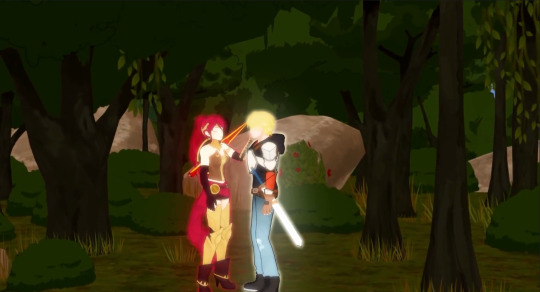
She awakens his aura, his very soul and later on trains him, so she helps his body get stronger:
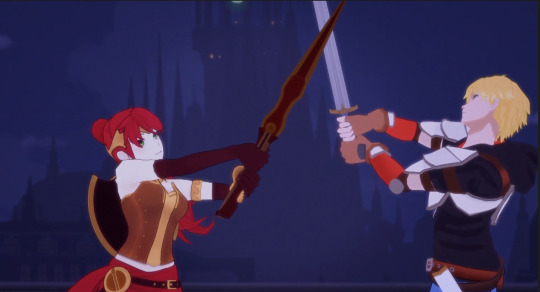
In other words, Pyrrha is the one who puts Jaune on the right path to become a true “hero” and a “warrior”.
This is Jaune’s objective since the beginning, but he initially pursues it in the wrong way:
Jaune: I don't want help! I don't want to be the damsel in distress! I want to be the hero!
He is fixated on an idea of hero which is outdated and has its root in toxic masculinity:
Jaune: Cause this is always what I've wanted to be! My father, my grandfather, and his father before him were all warriors! They were all heroes! I wanted to be one, too. I was just never good enough.
This is why symbolically Jaune wants to be like his male ancestors. He wants to grow into “a real man”:
Cardin: Let's see how much of a man you really are...
And this is conveyed also through his Weapon:
Jaune: It's a hand-me-down. My great-great-grandfather used it to fight in the war.
Jaune did not forge his own Weapon, but he inherited it. Crocea Mors initially represents the legacy he wants to live up to. However, this legacy, instead of driving him, slows him down because he can’t grow until he remains in his ancestors’ shadow. Jaune needs to develop his own individuality instead.
In order to do so, he needs to grow not only as a figther, but as a person too.
As a matter of fact, Jaune’s ignorance is not only limited to the world he has stepped into, but also to the people around him:
Jaune: That's easy for you to say. You've probably got guys clamoring over each other just to ask you out.
Pyrrha: You'd be surprised.
He is so self-focused that he does not notice others’ feelings and hurts them unintentionally.
However, Pyrrha teaches him once again:
Pyrrha:Tell her exactly what you said. No ridiculous schemes, no pick-up lines. Just... be honest.
It is thanks to her that Jaune manages to become a better man:
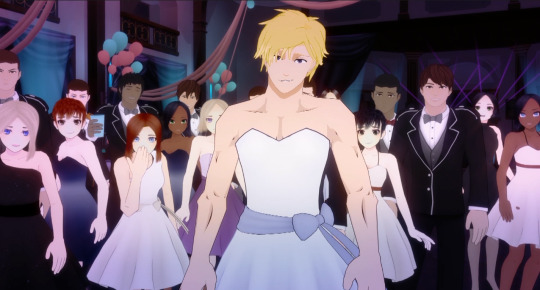
He is even able to call Neptune out the way Pyrrha did with him:
Jaune: Then just go talk to her. No pickup lines, no suave moves, just be yourself. I've heard that's the way to go.
And as a result, even Jaune’s relationship with Weiss gets better:
Weiss: You said you were embarrassed at first. What made you come talk to me?
Neptune: You're looking at him. You got some good friends looking out for ya.
Because the girl realizes Jaune is not only after her money or her romantic attention:
Weiss: All my life, boys have only cared about the perks of my last name.
But wants to genuinely be a good friend to her.
In short, Jaune starts the story as immature both as a fighter and as a person to the point that he is considered unfit and annoying by other characters:
Glynda: I don't care what his transcripts say. That Jaune fellow is not ready for this level of combat.
However, thanks to Pyrrha, he is given the chance to mature.
Not only that, but while other characters see a weakness and a nuisance in Jaune’s ignorance and inexperience, Pyrrha sees it as a possibility:
Weiss: Jaune, is it? Do you have any idea who you're talking to?
Jaune: Not in the slightest, snow angel.
Weiss: This is Pyrrha.
It is specifically because Jaune is new to Pyrrha’s world that he is free from bias:
Pyrrha: That's what I like about you. When we met, you didn't even know my name. You treated me just like anyone else. And thanks to you, I've made friendships that will last a lifetime. I guess, you're the kind of guy I wish I was here with. Someone who just saw me for me.
This is why Pyrrha feels she can forge a genuine bond with Jaune. What is more, the girl has faith in his potential:
Pyrrha: It's all right. I used my Aura to unlock yours, but the energy that protects you now is your own. You have a lot of it.
She sees in him what others do not and helps him develop both as a man and as a warrior.
This is well highlighted by the metal motif the two characters share.
As @hamliet explains here Rwby has several characters linked to the seven metals of alchemy.
The goal of alchemy is to create gold thanks to a process of refiniment that purifies the metal and has it go through several transformations.
The seven metals are nothing, but a scale that goes from the heaviest and most raw metal (lead) to the most purified (gold) passing through the others (tin, iron, copper, mercury, silver).
For a story, it simply means that a character goes through a process of change that leads to self-actualization.
In Rwby this idea is conveyed through specific characters embodying a metal (Ironwood, Penny, Mercury) or even thanks to metal motifs commenting a specific part of a character arc.
For example, Yang is associated with gold:
I am the golden one
Who burns just like the sun
But Adam takes her arm away and has her regress in the scale of metals to iron. This regression is not simply physical, but psychological as well:
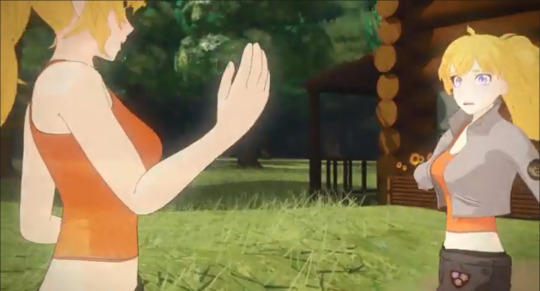
However, Yang re-affirms herself and moves forward. The first step of this process is to symbolically make her new arm “gold” again:
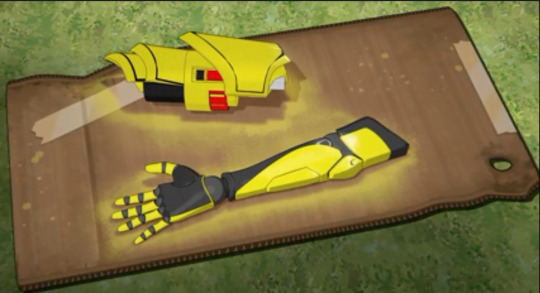
When it comes to Jaune, I think that he may be the character associated with lead aka the “prima materia” that needs to be molded into gold. Even if this is not true, metal is at least definately still a motif in his arc, as it is in Pyrrha’s. This is why both characters wear metal armors, differently from others.
Pyrrha is already close to her self-actualization and she reaches it in the climax of the Vale arc, where she completes her (tragic) arc and dies a Maiden.
This is why her armor is gold, while Jaune’s is white and gray. Pyrrha is at the top of the metal scale and close to the end of her journey, while Jaune is respectively at the very bottom and at the very beginning.
He is the embodyment of the prima materia that has potential for greatness, but only if he is rightly guided and if he himself works hard.
Pyrrha takes over herself the duty to help Jaune mold himself.
This is underlined also by Pyrrha’s semblance:
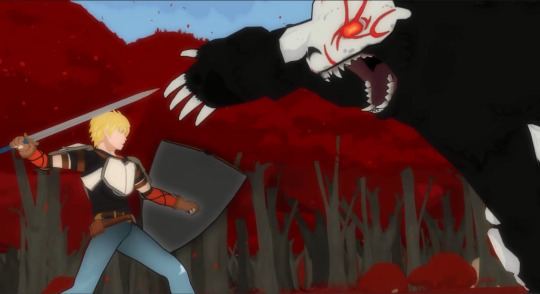
Pyrrha: Well, Ruby has her speed, you have your glyphs. My Semblance is polarity.
Pyrrha can control and bend metals and she shows her power for the first time when she helps Jaune against the Ursa, so that he can overcome his self-issues.
So, Jaune starts the story as the lead and is going through a path of self-refinement which will lead him to become gold, so more similar to Pyrrha herself.
Pyrrha offers him the basic knowledge to start this journey, but unluckily leaves him too soon and now Jaune has to move forward on his own.
THE CREATIVE AVENGER
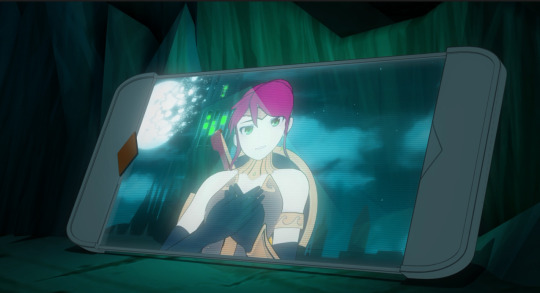
Pyrrha: I want you to know that I'm just happy to be a part of your life. I'll always be here for you, Jaune.
Even after Pyrrha’s death, this stays true:
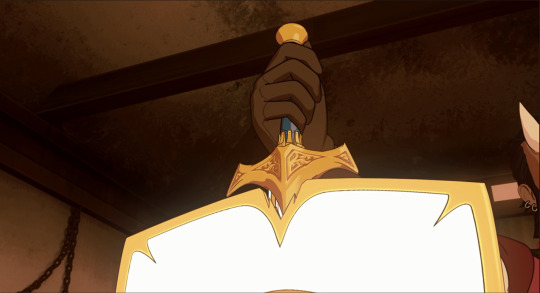
Blacksmith: That was some fine metal you brought me. Accents the white nicely. Where'd you get it from?
Pyrrha has become a part of Jaune.
This is a recurring motif in Rwby:
Penny: I won’t be gone, I’ll be part of you.
It is the idea that grieving is a process that leads to acceptance, but also to integration with a lost one. It is a way to have the deceased keep on living through the survivors.
In Jaune and Pyrrha’s case, this is conveyed through Pyrrha’s metal being used to enrich Jaune’s Weapon.
As stated by Ruby:
Ruby: Just weapons? They're an extension of ourselves! They're a part of us! Oh, they're so cool.
Weapons are symbolic of the self, just like Semblances.
What is more, Weapons and Semblances are also a declination of the dychotomy of body and soul, presented by the series.
Weapons are wielded by bodies, while Semblances are a materialization of the soul.
In other words, Pyrrha’s gold becoming a part of Jaune’s Weapon is symbolic of Jaune’s first step in a painful process that will lead him to overcome his partner’s death and to inherit Pyrrha’s legacy.
Jaune must keep on learning from Pyrrha and become more like her. As noted by @hamliet, this is symbolized also by Jaune’s design aquiring more golden details as he goes on in his journey:
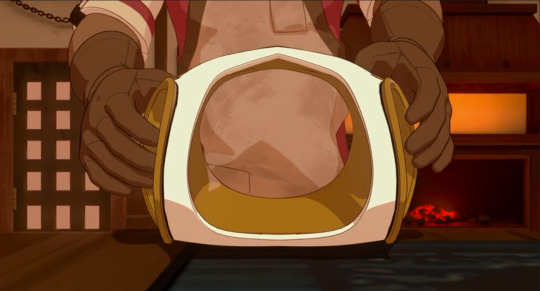
Jaune: Guess I was going to grow out of it eventually.
Ren: A sign of progress.
Jaune: Progress.
That said, grieving is not easy and Jaune must struggle with much pain and negative feelings.
This is why the changes he makes to Crocea Mors are finalized to increase its attack power:
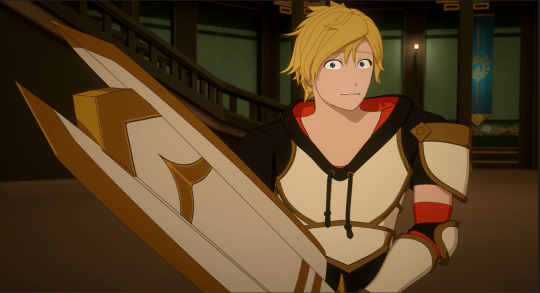
It is because Jaune feels anger over Pyrrha’s death and wants revenge.
In the Battle of Haven he gives in to his fury and tries to kill Cinder. He is trying to superficially imitate Pyrrha’s sacrifice:
Jaune: If I die buying them time, then it's worth it. They're the ones that matter.
However, he is not doing it out of bravery or necessity, but out of recklessness and self-hate. This is why his actions lead to this:
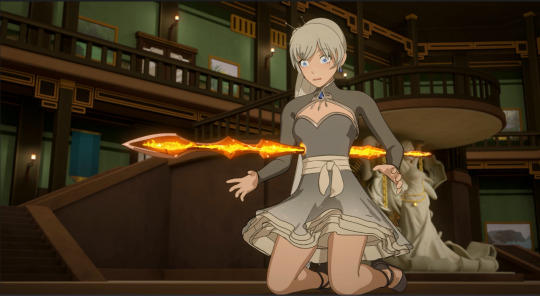
Once again, Jaune risks to lose another loved one:
Jaune: No, no, no, no, not again! Weiss, c'mon, please!!
However, this time he is able to save Weiss thanks to his Semblance:
Jaune: My Semblance?
Nora: How else do you think you're healing her, dummy?
Jaune gives up on using his Weapon to fight and chooses to use his Semblance to cure. He chooses soul over body and Creation over Destruction.
At the same time, Jaune’s activation of his Semblance is meaningful on two levels:
Jaune: No. I don't think I'm healing her. Our Aura heals our bodies. It feels... it feels more like I'm using my Aura to amplify hers!
Nora: Wait, aren't you worried about running out?
Jaune: Pyrrha once told me I've got a lot of it. I still believe her.
First of all, Jaune’s Semblance is rooted in the idea that people heal themselves. His power is not to cure others, but to amplify others’ auras, so that they can become stronger and can heal. It is about bringing out the best in others. It is a power fit for a leader, but also an ability symbolic of Jaune’s own process of healing. He can heal himself through helping others to heal.
Secondly, Jaune’s Semblance is in itself a nod to Pyrrha. Pyrrha used her own aura to awake his and Aura Amp is simply an evolution of this idea. It is not about activating others’ auras, but it is a power that lets Jaune share his. It also makes good use of something Pyrrha noticed immediately aka Jaune’s huge quantity of aura.
In other words, Jaune ends up acting like Pyrrha in the Battle of Haven, but not because he fights Cinder, but because he shares his gift with others, just like Pyrrha did with hers.
Pyrrha is a part of Jaune both in body (Crocea Mors) and soul (Aura Amp), but Jaune must still truly understand what this means.
He makes progress in Lost:
Red-Haired Woman: She understood that she had a responsibility... to try. I don't think she would regret her choice, because a Huntress would understand that there really wasn't a choice to make. And a Huntress is what she always wanted to be.
This is the essence of Pyrrha’s sacrifice. Jaune comes to understand it and chooses to make a similar choice together with his team:
Jaune: I think... I think she knew she wasn't going to win. That she might not come out alive. But... she also knew she was the only one that could try.
Ren: So she did.
Nora: Maybe we should too.
Jaune: Yeah, we should.
In this way, it will be as if Pyrrha were fighting together with them:
Nora: Pyrrha may not be by our side anymore, but we can fight like she is.
Jaune: And in a way... she will be.
Jaune tries to overcome his anger and his sadness for Pyrrha’s death in order to keep fighting like she did.
So, once again he chooses this:
Ruby: I wanted to protect my friends.
Maria: Precisely! It is the desire to preserve life which fuels the light inside you. And to make no mistake, it is light. Preservation is an extension of creation, or, at the very least, an enemy of destruction. The Creatures of Grimm were made by the God of Darkness, but your light comes from his brother.
He chooses to protect life and this is the essence of Creation.
Once he confirms this choice, he is free to explore Creation’s potential and he does so in the land of Creation itself, Atlas.
He strengthens his shield instead of his sword:
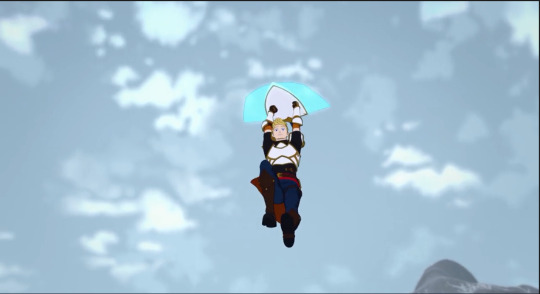
And he trains his Semblance:
Oscar: Nice, your recovery is getting faster.
This all leads him to become stronger psychologically:
Ren: Him on the other hand... There's no fear at all. I can see it, he believes we're going to get this done.
That said, Jaune starts meeting limits to his new found strength rooted in Creation:
Jaune: Ah, sorry. No matter how much I boost you, they won’t go away.
Jaune: Did... I stop the virus?
Penny: No. It’s still there.
Jaune’s way to move forward is to heal himself through healing others. Still, what to do when this is not possible?
THE DESTRUCTIVE HEALER
Penny: No… there’s not enough time to heal me…
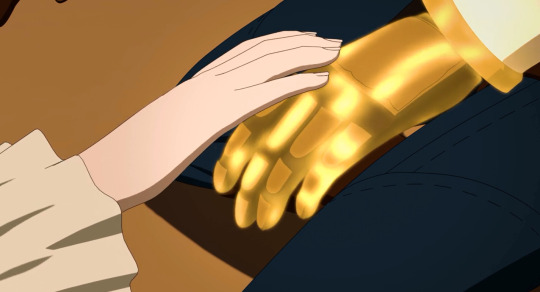
Penny: But there is something you can do…
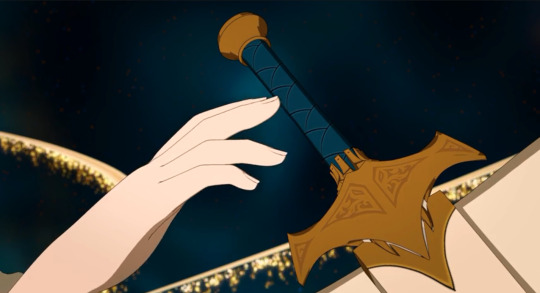
What happens in Atlas is an inversion of Haven.
Penny pushes Jaune’s Semblance away and touches Crocea Mors.
Jaune is asked to give up on healing her and to speed up her death instead. He is asked to choose his Weapon (body) over his Semblance (soul) and Destruction over Creation.
This marks the characters entering the Destruction phase:
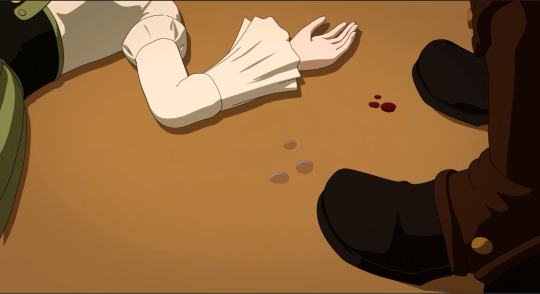
Leaving Creation (Penny) behind.
For Jaune, this means that his own self image that he has worked so much to build and to make his own:
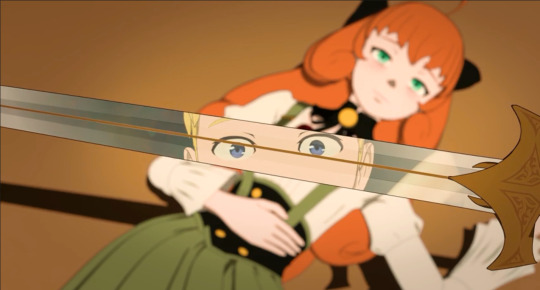
And that has been enriched in Anima thanks to Pyrrha...is shattered:
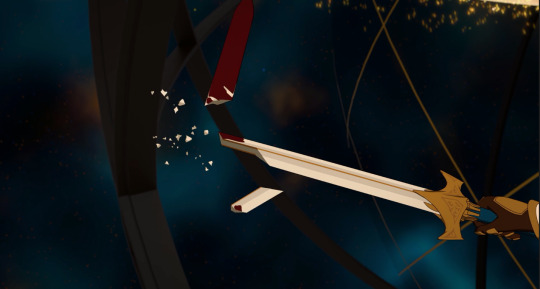
At the same time, he is once again put in a similar spot as Pyrrha:
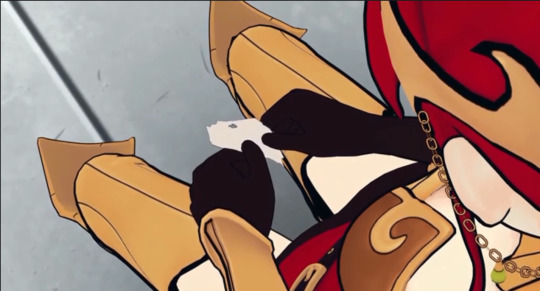
They both become unwilling agents of Penny’s death because of Cinder (and Emerald and Mercury in the first case):
Pyrrha: Ruby, I... I'm so sorry.
Ruby: Me too. But it wasn't your fault.
Jaune: She's right. Whoever was on that microphone... they're the ones that did this. And we have to make sure they don't take anyone else.
So Jaune’s journey to integrate with Pyrrha, to understand her and her struggle continues.
What now?
It is too soon to say because we have yet to properly start our journey through Destruction and what it is about.
That said, there are two things that are worth highlighting. The first is a motif Rwby is following, while the second is a general theme found in many stories.
1) As @hamliet has stated in many metas and as I have written here, Rwby is an alchemical story. Alchemical stories are usually marked by three important deaths. Each death is symbolically linked to a color. They are usually black, white and red. However, sometimes there can be yellow instead of the white or the red. This is the case here, where a resonant death is the yellow death aka Penny’s.
It is a death that happens while the characters are surrounded by yellow:
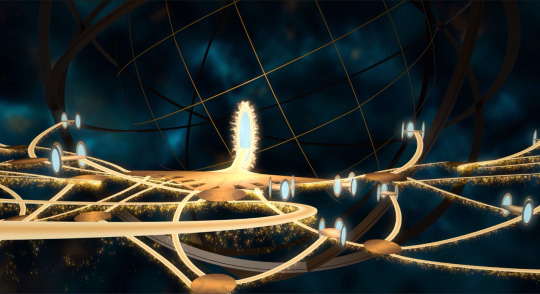
And it happens through a weapon called “Yellow Death” (Crocea Mors’s meaning). So, it is really not subtle. Penny’s death is meant to mark an important passage for our protagonists, just like Pyrrha’s one (the black death).
2) It is common in stories that deal with healers to explore the concept of death as well.
The basic idea is that a healer is a person meant to cure. That said, they will meet people impossible to cure and that will die on their watch. This is an unescapable truth a true healer must live with.
Let’s highlight this theme is found in works very different for genre and culture.
Let’s have two examples.
Scrubs aka an American comedy about doctors deals with this theme multiple times. In many episodes the characters must simply accept they can’t save a life, but must still not lose hope and keep on living themselves.
Yosano from the manga BSD says so:
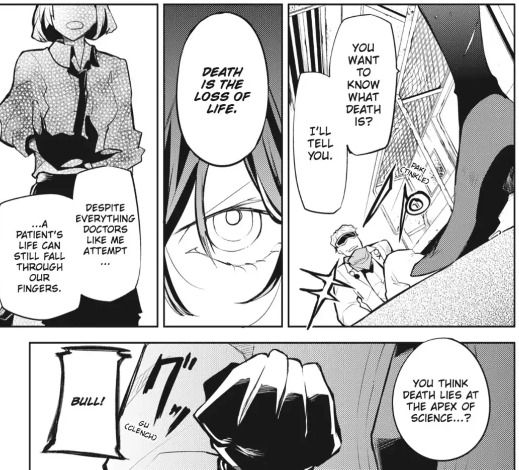
Her backstory explores the link bewteen life and death further since it is shown that a power that cures fatal wounds can be used to cheapen life itself:
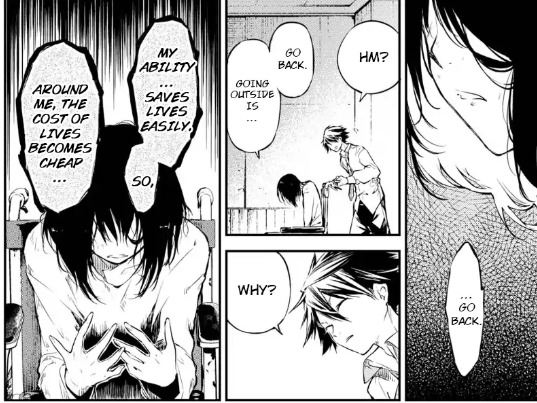
It is too soon to say if Rwby will explore a similar theme, but the fact that Jaune, (the healer) is the one that has to speed up Penny’s death might be a very powerful and poignant choice. This is true especially because Rwby does not refuse Destruction (and so does not refuse death), but presents it as a principle equal to Creation (so as a part of life).
THE CHOOSING HERO
Jaune’s arc is about living Pyrrha’s death over and over again with different scenarios and outcomes. This happens so that in the end he can finally overcome it.
So far, it has happened three times and each time has been in the climax of an important battle.
The Battle of Beacon has him witness powerlessly to Pyrrha’s death (lack of knowledge and passivity).
The Battle of Haven has him saving Weiss (creation).
The Battle of Atlas has him killing Penny (destruction).
What is more, every time Jaune becomes more proactive and conscious of what he is doing.
In Beacon he has no idea of what is happening. He works with little information and things happen to him without him being able to do anything.
In Haven his actions lead to Weiss being in danger, but he manages to save her. That said, he does not do it consciously. He unlocks his Semblance because of emotional stress. It is an unconscious choice and not a conscious one.
In Atlas he makes a specific conscious choice, but it is a choice that is forced on him because of external circumstances. It is also a choice that is meant to challenge and temporally break him.
In other words, he is slowly and painfully approaching Choice aka self-actualization. Right now, he has to face the consequences of Penny’s death, but this will probably lead him to finally enter the Choice stage and to complete his arc by becoming a “hero” aka gold (probably).
At the same time, this final choice will also be about healing and overcoming grief. It will be the final integration with Pyrrha and him being able to honor her legacy.
After all, we have been told from the beginning what Pyrrha’s fate would have been. We’ve just failed to notice:
Pyrrha: For it is in passing that we achieve immortality. Through this, we become a paragon of virtue and glory to rise above all, infinite in distance and unbound by death. I release your soul, and by my shoulder protect thee.
June and Pyrrha’s bond is eternal and she is meant to be the key character in Jaune’s arc. It is only through confronting and finally overcoming her loss that Jaune can finally self actualize and become the person Pyrrha has always known he could be. Pyrrha will symbolically be with him in this struggle. Her memory will protect and inspire him.
163 notes
·
View notes
Text

@kurapikawithagun - sorry, i know there’s a lot of text here. but was it one of these?
on second thought, post is way too long, so i edited this with a “keep reading” section. includes excerpts about how “plant collectors followed the Conquistadors”; Spanish and British botanists wanted to “de-territorialize” or “de-anthropologize” knowledge of plants by removing plants from local cultural context, gatekeeping and systematizing knowledge, and subverting local Indigenous/traditional knowledge-holders; creation of Britain’s first botanic gardens including world-famous Kew Gardens were designed to service plantation owners and the East India Company; how 18th/19th-century European naturalists were “agents of empire” who collected “green gold”; how plantations and imperial botanists turned plants from “companions into commodities” and established racial hierarchy; early science of botany functioned as a “teletechnique,” a way for an empire to “act-at-a-distance” on and against colonized lands and peoples; how British military commanders and economists ran the botanic gardens at Calcutta, Madras, and in the Caribbean; how British administrators dismantled local Indian knowledge and land systems by using key legislation in the 1780s/1790s to dispossess people of their lands before compelling those former gardeners to become forced laborers on tea plantations; gardens as part of American nationalist imaginary and “moral improvement” in the 1800s; how native plants and traditional knowledge of Indigenous peoples, Black communities, and the rural poor have been appropriated by “overwhelmingly white metropolitan homeowners” looking for “ecologically friendly ways of aesthetising their properties” in fads of contemporary South Africa; how imperial botany created a “monoculture of knowledge” to overshadow or control a multitude of other local “ecologies of knowledges” and ways-of-knowing; etc.
-------
In a 1998 interview [...], in advance of the release of her third novel, Gardens in the Dunes (1999), Leslie Marmon Silko explains how she became interested in plants: “They come from all over the world, and they’re also another way of looking at colonialism because everywhere the colonials went, the plants came back from there.” [...] Silko confesses that “it wasn’t too long before I realized how very political gardens are …. I had actually stumbled into the most political thing of all – how you grow your food, whether you eat, the fact that the plant collectors followed the Conquistadors.” [...] Gardens revolves around the colonization of indigenous minds and bodies through a variety of processes under the flag of manifest destiny: the loss of land and natural resources in general and the disruption of Native foodways in particular. […] Moreover, it problematizes the privatization of food commons and its negative impacts on local communities from the Gilded Age to the present. […] Silko, a writer of Laguna Pueblo, Mexican, and Anglo-American ancestry, employs the trope of the garden as a means of critiquing and revising modern America’s ecological imperialism, which has attempted to naturalize the conquest of Native lands and foodways. […]
Plant collectors served as what David Mackay calls “agents of empire,” their inventories full of precious and at the time unknown plants and medicinal herbs collected from indigenous peoples that they then shipped to various libraries, museums, and botanic gardens in the Western world. According to historian of science Linda Schiebinger, while “early conquistadors entered the Americas looking for gold and silver,” naturalists, their successors in the eighteenth century, were more interested in “green gold.” Whether they were “voyaging botanists” sponsored by trading companies or sent by the government, the central task of these botanists was to bring valuable plants “all into production within the boundaries of the empire itself.” […] [T]he trope of “I am monarch of all I survey” […]. The power relations between “seeing” and “being seen” suggest that Western science aids the conquest of the Americas by positing a distance between the colonizer and the colonized. […] Collecting, whether via bioprospecting or photography, thus exemplifies the colonial ideology inscribed in Western science that transforms Indigenous peoples and their traditional knowledge into possessable objects and buttresses the structural inequalities that cement the colonizer’s privilege. In her provocative essay on mushrooms as companion species, Anna Tsing has convincingly argued that the plantation system served as “the engine of European expansion” because it was able to produce enormous wealth based on “the superabundance of a single crop” and “cultivation through coercion.” To manage many plantations in colonies more effectively, Europeans eliminated the affective relationship between humans and plants: the labor needed for plantation cultivation was forced through slavery and indentured servitude, a racial hierarchy was created to draw a clear line between white property owner and colored worker, and plants were treated as commodities rather than companions. The legacy of the plantation system, as Tsing puts it, lies in the ways it has shaped the conditions of racial capitalism and environmental exploitation and in the ways it continues to structure “how contemporary agribusiness is organized. […] Commenting on the interrelationship of imperial botany and commerce during the colonial period, Schiebinger explains that “the botanical sciences served the colonial enterprise and were, in turn, structured by it.” Silko’s novel, then, shows how botanical gardens in Europe functioned, in Schiebinger’s language, as “experimental stations for agriculture and way stations for plant acclimatization for domestic and global trade, rare medicaments, and cash crops” against the common view that gardens like the Kew were centrally “intended to delight city dwellers.”
Source: Yeonhaun Kang. “The Garden in Motion: Botanical Exchange and Transnational Collaboration in Leslie Marmon Silko’s Gardens in the Dunes.” 2019.
-------
After numerous false starts, and with the crucial aid of the practical embodied knowledge of the many Chinese gardeners who were literally kidnapped to India together with the tea plants, the Calcutta Botanic Garden and the pre-colonial Saharanpur Garden that was re-developed by the colonial administration, played pivotal roles in the emergence of colonial India as the major producer of tea. The practical knowledge possessed by the initial group of abducted Chinese gardeners eventually fed into incipient botany in the colonial setting. The tea plants transplanted from China to the botanic gardens in India were eventually transplanted to the massive rationalised tea plantations in Assam and parts of South India such as Ooty and the Nilgiris (Sharma 2011; Philip 2004). The lands for these plantations were acquired after the large-scale dispossession of the populations of Assam and Ooty, and the relocation and deployment of the people alienated from their lands as forced labour on the very lands they once possessed and cultivated. The setting up of the colonial botanic gardens, spurred by the crises generated by colonialism, also set in motion multiple transfers and transplants, local and global, of plants, people, culture, agriculture and the eventual transformation of practical knowledge into formal botanical science devoted to [...] production [...] and productivity [...]. These experiments conducted at the Calcutta Botanical Garden also provided institutional and intellectual opportunities for botanical careers for many colonial officials.
Source: Zaheer Baber. “The Plants of Empire: Botanic Gardens, Colonial Power and Botanical Knowledge.” May 2016.
-------
In this conception operating in the eighteenth century, there is no Nature without Empire. […] To “de-anthropologize” the knowledge of plants, also involved “de-locating,” or better still, “de-territorializing” it. Botany was emerging as a science separate from medicine, but also from chorography as territory became a vegetal mantle, a sort of carpet for plants to lie upon. […] Botanical nomenclature was also a matter of political nomenklatura: the exclusion of native names from the field of science defined new power relations. It acknowledged the authority of imperial botanists and belittled local herbalists and herbal practitioners. Nomenclature, indeed, displaced traditional wisdom: Nahuatl came to be considered as an unintelligible, garbled language [...]. This spatial strategy tends to identify certain regions with some characteristic species. This allowed a selective fostering of farms and forestry in those areas rich in species of particular interest to the Spanish Crown. Plants ceased to be the business of experts and became the concern of politicians. Botany came to strengthen imperial politics. [...] The plants themselves and not their products became the stuff of trade, and what circulated through the networks were ideas on how to mobilize species and how to denature them. Botany began as atechnoscope – a way to visualize at-a-distance – but, at the end of the eighteenth century, it was already a teletechnique – a way to act at-a-distance. Its success as an imperial undertaking was linked to the ability to set up an international network of professorships, gardens, expeditions and publishing companies able to produce aversion of Nature easily put into words, and deducible from very little data. […]
Source: Antonio Lafuente and Nuria Valverde. “Linnaen Botany and Spanish Imperial Biopolitics”. 2011.
-------
“’These are my conquests,” Josephine, wife of Napoleon Bonaparte, is reported to have said of the roses and lilies in her renowned garden showcase,” Bennett writes. […] “She would spend as much as 3000 francs on a single rare bulb […].” Gardens are “the most political thing of all – how you grow your food, whether you ear, the fact that the plant collectors followed the Conquistadors,” Leslie Marmon Silko told Ellen Arnold on the eve of the publication of Gardens in the Dunes [1999]. “You have the Conquistadors, the missionaries, and right with them were the plant collectors.” […] In Gardens, Silko uses the image of the garden to illustrate imperialism on international, national, local, and domestic levels. […] Silko offers a microcosmic history of ancient conquest, European imperialism, and modern botanical piracy, while demonstrating commercial trivialization of the sacred. […] The gardens […] exemplify America’s nineteenth-century gardening ideologies. In his 1782 Letters from an American Farmer, Hector St. John de Crevecoeur wrote of the spiritual benefits of agricultural labor. By the mid-nineteenth century, this idea had evolved into gardening as a form of moral calisthenics. […] According to historian Tamara Plakins Thornton, in the 1820s “[h]orticulture entered the mainstream of American life … as a movement [that] promised … moral benefits to an entire nation.” […] Further, by the 1890s, thanks to the early-nineteenth-century efforts of America’s premier landscape gardener, A.J. Downing, and, later, British gardening authority Gertrude Jekyll, landscape gardening had achieved the status of a fine art (Thornton; Bisgrove). It was in 1893 that historian Frederick Jackson Turner announced that the American frontier was “closed.” With […] Native peoples more or less incarcerated [...], the American landscape garden provided a blank canvas on which the gardener could impose control and exercise her fine art […].
Source: Terre Ryan. “The Nineteenth-Century Garden: Imperialism, Subsistence, and Subversion in Leslie Marmon Silko’s Gardens in the Dunes.” Studies in American Indian Literatures. Fall 2007.
-------
Many colonial administrators were of course active in mobilising the tremendous economic potential of plants in the imperial project. At the same time however, there were many others who, although they were key actors in the colonial project, were also specifically interested in enhancing their cultural and intellectual capital by becoming “scientists.” [...] The British Empire, as well as the other European empires of that period, constituted one of the many institutional crucibles in which the sciences of plants literally germinated, took root and flowered. Plants constituted an integral element of colonial power [...]. This goal of setting up a rationalised system of administration and revenue collection was a major impetus behind the “great surveys” initiated by the East India Company. [...] The company officials were also familiar with the existence of a pre-colonial Botanical Garden in Saharanpur in northern India (Hyde 1962) and of course Kew Gardens in London, even though the latter was set up primarily for the cultivation of medicinal plants and had not as yet emerged as the major scientific institution that it would become later. The company had also set up smaller gardens in St Vincent in the West Indies for the transfer of the breadfruit tree from Tahiti to provide, in the words of the President of the Royal Society, Joseph Banks, “food for slaves” (Mackay 1985, 127). In the context of a dramatically transformed Indian social structure coupled with serious concerns over the erosion of the legitimacy of their rule in the eyes of their Indian subjects, officials of the company were extremely receptive to the idea of a major botanical garden and its potential for restoring stable revenues. […] In less than four years after Kyd’s original letter of 1786, generous grants from the Court of Directors in London made possible the establishment of the first modern Botanical Gardens in Calcutta, Madras and Bombay, as well as in distant St Helena. […] Unsurprisingly, the first superintendent of the Calcutta Botanic Gardens was Lieutenant-Colonel Kyd himself and the plants that were transplanted there from Southeast Asia were exclusively those that were essential for trade and competition with other colonial powers (Burkill 1959). These included cinnamon, coffee and black pepper. [...] In the same vein, the Bombay Botanic Garden was established due to the initiative of Dr Helenus Scott – a friend of Banks, President of the Royal Society – with the express aim of conducting botanical experiments for the cultivation of sugar, indigo, tobacco, coffee and more.
Source: Zaheer Baber. “The Plants of Empire: Botanic Gardens, Colonial Power and Botanical Knowledge.” May 2016.
-------
Imifino is the collective noun isiZulu speakers in KwaZulu-Natal use when referring to auto-propagating leafy green vegetables that have a penchant for thriving in marginal soil. As interest in indigenous plants has grown, these vegetables – long an unheralded staple of the rural poor – are now at the centre of state and scientific attention. Plans are afoot to codify, patent, and popularise ‘indigenous knowledges’ for a variety of ends: the enhancement of national competitiveness; revalorisation of indigeneity; pursuit of food security; and of course the stimulation of profit-making. […] Subsistence cultivators, however, are not alone in cultivating indigenous flora. About three hours south, in the city of Durban (and throughout South Africa) something called ‘indigenous gardening’ has gained popularity since the end of formal apartheid. As we elaborate later, ‘indigenous gardening’ is a name reserved for a specialised field of activity, a metropolitan affair practised by conservationists, botanists, real estate developers, horticulturalists, architects, and enjoyed by mostly white upper class homeowners for a variety of purposes, especially those associated with conservation. It is sanctioned by science and other kinds of credentialed expertise, and geared towards enabling overwhelmingly white metropolitan home owners to pursue ecologically friendly ways of aesthetising their properties, rather than towards matters of subsistence undertaken by those deemed the black rural poor. From the vantage point of our conversations with subsistence cultivators like Gogo Qho, we wonder, ‘Why do overwhelmingly white metropolitan homeowners specifically want indigenous plants to adorn their properties? What kind of desire for indigeneity is being pursued here? What is Indigenous about Indigenous gardening other than plants?’ […]
Source: Narendran Kumarakulasingam and Mvuselelo Ngcoya, “Plant Provocations: Botanical Indigeneity and (De)colonial Imaginations.” 2016.
-------
Landscapes and vegetation are not simply the backdrop against which violence and dispossession unfold, but are mobilised as the very medium of violence [...]. Key here is the space of the garden, in multiple ways. Gardens in the Western imagination often have utopian, pre-lapsarian associations, but are in fact riven with ambivalences that stem from questions concerning who is displaced in order to demarcate their boundaries, and whose labour is exploited to maintain them as sites of nourishment and enjoyment. [...] As such, the colonised subjects remain cast out of the [...] garden of earthly delights, even if its is precisely through their knowledge and labour that the actual garden feeds and sustains the symbolic garden -- notably, the plantation system [...]. In the context of imperial botany the space of the garden was vital, with the frontrunners of the modern scientific botanic garden, which were established in sixteenth-century Italy, combining ‘the scientific ideal of comprehending universal nature’ [...] ‘by gathering together all the creations scattered at the fall of man.’ As such, the botanical garden can be understood as a laboratory of empire, as can tropical island colonies (also incubators for the revival of European Edenic dis/course) and the space of the plantation more broadly. Moreover, the construction of the category of the ‘damnes’ of the earth needs to be read in the context of this wholesale classification of forms of life enacted by imperial science. Notable botanists such as Linnaeus, as well as Hans Sloane and Joseph Banks, were influential in the development of scientific racism, as well as the endorsement of slavery and colonisation of foreign territories. Colonial natural science [...] was central in the construction of race and sexuality [...]. By and large, imperial science (what we might call a ‘monoculture of knowledge’) excluded other, ‘minor’ histories and systems of knowledge (’ecologies of knowledges’), as well as modes of being-in-the-world that are not premised upon the value, profitability and usefulness of plants [...].
Source: Ros Gray and Shela Sheikh. “Introduction” to The Wretched Earth: Botanical Conflicts and Artistic Interventions. Third Text. 2018.
254 notes
·
View notes
Text
Of potions and myths - Chapter 4
William “Ironhead” Miller x f!reader
Word count 3,6k
Warnings: Some insecurities, some angst, a lot of talking
A/N: We finally meet the elders and start to get into the bottom of what is happening. Basically a lot of talking happens.
Chapter 3 - Chapter 5
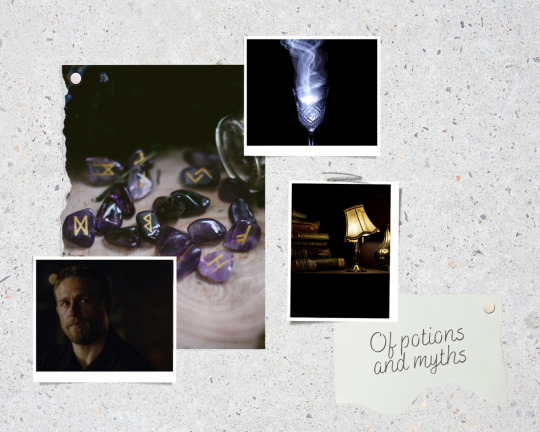
Six new people step inside Pope’s living room, making it feel very crowded. You watch them silently as they approach you, the hand on your hip tightening as the room settles. The connection feels frantic now, bouncing between your bodies as it tries to make sense of your emotions. He’s nervous, just like you are, you realize as you catalogue them. It feels daunting to come to this conclusion about the man who has kept a level head so far and has been a rock of calmness for you.
“Hmm… I sense a power in this room.” One of the elders speaks in a low tone. He steps closer to you, cocking his head to the side as his honey-brown eyes search for your soul inside. You refuse to back down, no matter how scared you are, and face him.
Will grips you tighter, his own eyes flashing to red quickly as the man comes closer and closer, until you are practically nose to nose. A warning growl rumbles out of his chest, but the elder only chuckles in response. He raises a hand to place it on Will’s shoulder and it looks like the Captain barely keeps himself in check and doesn’t bite the offending weight off.
“Calm down, William. I mean your mate no harm.”
Mate? What mate?
“What do you mean, mate?” Will asks, echoing your thoughts. The elder chuckles again before stepping back a little, releasing his hand on Will’s shoulder, and you can see the tension in his back muscles ease minutely. It’s still there, brimming under the surface, but now that the man has backed up, it’s easier to breathe.
From the corner of your eye, you see Pope, Frankie and Benny move closer to you, flanking your sides in support. This time Will doesn’t growl when Benny brushes your shoulder quickly with his own and you file the information for later investigation.
“I can feel the mating bond between you two. It’s very unusual that it’s even here, the bond hasn’t been recorded in centuries.” He muses and the others murmur something amongst themselves. They seem to converse in broken words and sentences, leaving you and Will and his brothers out of it.
“I’m sorry, I don’t follow,” You finally pipe up, growing more confused by the minute. Another elder steps forward and gestures for all to sit. “My apologies, my child. You are not one of us and this is something many of us have forgotten also since it’s been buried for so long.” She has a sweet voice, soft and calming. You feel somewhat better as she takes the lead.
“Please sit down. I will answer any questions you have, if you answer ours in return.”
You follow her words, pulling Will with you to the loveseat. Benny takes the armrest closest to you and Frankie the other, Pope choosing to remain standing behind you. Despite any worries or hesitations they might have of you, they will stand by their brother it seems and it warms you from inside out.
“Many centuries ago, the bond was a way of finding out the most compatible companion. A mate.” She begins.
”An unmated wolf would feel a pull, a connection, with the one best suited for them. The connection would grow over time, sometimes manifesting in the physical appearance of colored tendrils until a bond was fully formed. Mated couples often reported being able to feel extreme emotions from one another and if and when the other half of a mated pair died, the other never took another.”
So far you can tick off every box from the list. You chance a look at Will, but he’s looking intently at the elder speaking. As the crowd remains silent, she continues.
“But as the bond was so rare in the first place, it slowly became rarer and rarer as time went on and wolves stopped looking for the clues, finding alternative means of securing a partner. I think the last recorded bond between two people is over 300 years old. And it’s never been recorded between creatures either.”
She glances in your direction, her eyes knowing something that you don’t. You cock an eyebrow at her choice of words, but choose not to comment. Will also remains silent, not divulging your status which you are grateful of as the elder continues.
“The only thing that remains is that once a wolf has a partner, a mate, it is for life. Santiago, you are familiar with the wows of our clan when someone chooses a partner. Tenebo te in corde meo usque in sempiternum. Tu solus. The bond is where they originate from.” (I will hold you forever in my heart. Only you.)
You recognize the words to be Latin, though some of the meaning is lost on you. Judging by the sharp intakes of breaths from all the men around you, they are valued highly.
The elder isn’t finished yet though. Her eyes slowly turn yellow as she regards you. “How did this originate? How long have you felt this between you?” She asks gently.
“We met last night,” You tell her and witness several raised eyebrows as the timeframe registers. “He saved me from an, let’s call it an unfortunate event, and when we spoke outside, I started to feel this pull towards him. It’s hard to resist it and it grows as we become closer.”
“Closer?”
“For example, when we touch, skin on skin, there are these golden and silver tendrils all over our bodies.”
To demonstrate, Will traces your forearm with his finger and everyone in the room watches as a silver line appears, followed by a golden one. They dance and glow on your skin before disappearing after he lifts his finger off, fading away slowly. “The longer and more, uh, intimate the touch, the more vibrant the colors are. And the longer they stay visible.”
Pope coughs behind you and Frankie snickers at the words, but a sharp look from Will shuts both men up quickly. The elders seem nonplussed at the information, almost as if they were expecting it, and the man who previously studied you leans forward.
He starts firing off questions, about the intensity of the colors, the pattern and how long the tendrils stay on the skin after the touch ends and if you have any other symptoms. You and Will both try to answer as best as you can, with Benny piping up when it comes to the length of time but a lot of it is still shrouded in mystery.
It feels almost like an inquisition as the rest of the elders join in on the questions. You lose track of how many you answer and you can feel Will feel the same, the irritation running off him in waves. You talk about your past, your studies and your work, the emotions that have transferred over, how it affects you when the emotions hit you. You describe the dizziness, the magnetic pull, the happiness in the hum as you are close.
Will talks about his desire to protect, the warmth of the tendrils as they move on his body and the hunger that makes his wolf crawl and pounce in his chest, wanting to be let loose. He describes the anger he felt at the pub when he understood what would happen and the physical pull he felt to stay outside of your door and the worry he felt as your knees buckled when the wave of his emotions hit you.
When they are finally out of questions, you feel like slumping back to the couch in exhaustion. It’s almost like you’ve just ran a marathon and recited your entire dissertation at the same time. Benny hands you a bottle of water from the kitchen which you chug down eagerly, your throat parched. From the corner of your eye, you see Will do the same, emptying half of the bottle in a few gulps.
But there is something inside you, a question that burns in your mind that is begging to be let out. You turn towards the woman. “You spoke of the bond being between two wolves. But I am not a wolf, nor is anyone in my family. Actually, I’m nothing at all, just a mundane. Why has the bond decided to connect us?” Beside you, Will lets out a huff of disapproval, clearly disagreeing with your notion that you are nothing, but you ignore it now. You can grapple over details later.
“It’s a very good question, my child. But clearly the bond knows more than what we do now. The connection has always been rare and not all wolves experience it. So it’s not to say other creatures, or even mundanes such as you, experience it too but in a very rare form.” She looks at her peers, something flashing in her eyes before continuing hesitantly.
“Maybe…”
Will intejects quickly. “Maybe what?”
“Maybe you need to try and complete the bond to see what happens. If it takes or if it was only a false alarm.” She offers finally, after a long moment of silence. You feel like the wind is knocked out of you. It sounds very ominous and there is even a chance that all this is for nothing? Your shock must show in your face, because she is hasty to continue.
“We are walking on uncharted territory here, so we don’t exactly know what is going to come once the attempt to complete the bond is made. So I would advise you to think carefully if you want to proceed with this. Once the decision is made, you would complete it here, within our pack grounds for safety.”
You mull over her words, trying to organize your thoughts. You feel Will reach out to you, surely with questions of his own but your next one slips out before you can fully comprehend the possible damage they might do.
“And should we want to break this connection?”
Your words hang in the air but it feels like a bomb has gone off. You feel Benny turn to look at you, his eyes burning on your face, and Pope lets out an involuntary sound of protest. The elders all look at you in surprise and you can feel your ears buzzing with static as they register what you just asked.
You start to open your mouth to explain you only want to know the options available but the body next to you jumping to his feet and stomping out of the house stops that in its tracks. You all watch as the broad shoulders disappear outside the house and a door slams in its wake.
You wince and hunch your own shoulders forward as you wish you’d stayed silent, maybe bought in your stones to help. You could really use a little extra now that the three men turn to look at you with disapproval.
Will doesn’t look at anyone as he rushes out, feeling the tightness in his chest spread rapidly. He can hardly breathe properly and as he leans over the terrace railing, he can feel the agitation of his wolf as the animal weeps and howls inside him.
He doesn’t see it but he knows that his eyes are flashing rapidly and he can feel the need to shift, to run and be alone in the woods. It itches under his skin, clawing out to change skin into fur and fingers into paws. He paces the porch, opening and closing his fists to stop himself from shifting in broad daylight.
Is he alone with his thoughts, his dreams, his hopes? Surely he must, because you can so easily ask about breaking the bond. Like this isn’t it for you like it is for him.
He knows it’s crazy to feel this way, to want something so big and grand after such a short time. He can’t help himself though and his wolf agrees; he’s fallen in love and he’s not going to change his mind.
It feels so different compared to all the times he’s had a girlfriend. Even the one time he had a fiancée, someone he thought he was ready to commit to, even then it didn’t feel like this. The burst of warmth he feels whenever you look at him, the undeniable pull he has when you aren’t touching each other and the mere idea that you don’t want this leaving a gaping wound on his heart. It has taken over him completely and he has willingly surrendered to it.
He thinks about his former lover, wincing at the final memory in the parking lot of Publix after the altercation, trying to find differences between that relationship and what is budding here.
Had the bond been there even then? Was that the reason his fiancée left, why he couldn’t calm himself down in her presence? Why she had to jump on his back and still it wasn’t enough to break his grip? Was he not damaged goods and a complete failure in love after all? Or worse yet, was he because it seemed so easy for you to talk about breaking the connection?
A soft tap on his shoulder makes him whirl around and face Frankie, who looks sheepish at being sent over to check on him.
“You good?” The other man winces when the words leave his lips, he can clearly tell from the agitated look Will is sporting that the blond man is definitely not good. He just shakes his head and rubs the back of his neck, gazing off somewhere behind Frankie’s shoulder. Slowly Will gathers his thoughts, using the skills taught to him to place all his worries into tiny little compartments in his mind. He lets out a breath and counts them for later, before turning to his brother.
“Not really. Did the elders give out the instructions to break the bond yet?”
He sounds defeated even to his own ears but there’s nothing to be done about it now. Despite the want and need and desire to go all the way, whatever the completion of the bond means, if you won’t do it, neither will he. He won’t force it, never can and never will, and he will respect your decision.
“No. The elders are talking with one another now, gathering all the needed information so you can talk with your mate and make a choice. You know the question needed to be asked, deep down.”
“Yeah.” Frankie is right, Will admits to himself. The logical side of him wins out, but the sting of rejection is still there.
“At this point we don’t even know what it will take for you to try and complete it. But you acting like this, all out of character, doesn’t do any good. Your mate is just as distressed as you are about this, possibly even more considering this is all so new and unexpected, and I can smell the conflicted emotions on both of you. Find out the options, talk it out, make a decision together. It’s the only way any of this can work.”
“Mmmmm.”
“You know I’m right, hermano.”
“Don’t let it go to your head, Fish, it won’t do you any good.” Will smirks as he claps his brother on the back and the other man only grins wolfishly in return before guiding them back in.
You sit and wait quietly inside, shoulders tight, mulling over your own thoughts. You wish you were with your books in your tiny cupboard of an office back at the museum, helping the elders figure it all out but you suspect that something this intimate would’ve been recorded into writing.
What does it take to complete a bond? You shift through your mind, trying to think of bonding spells but most of the ones you know only bind two inanimate objects to one another or help with the natural bond created in nature. Nothing about two humans, mythicals or not, connecting on a level deeper than normal. .
But would you want to break it or complete it? That is the million dollar question. Both surely have their risks but ultimately it is about if you want him in your life and if he has those same feelings. And your feelings are all jumbled up and you can’t help but to wonder if they are real or a byproduct of the connection.
As the two men return to the room and take their places, it feels icy cold when Will doesn’t touch you, choosing to sit as far as possible from you. You want to reach out, explain yourself and your thoughts, talk to him freely but he refuses to glance at you, keeping his head high and aimed forward. You are resigned back to silence as you wait for the elders to return with more news.
The only sound is the ticking clock on the wall as all of you are wrapped in your minds. It ticks forwards slowly but surely and as the hour chimes a change, one of the elders return into the room. He isn’t the one from before, but a short and stocky man with a gentle expression on his face and keen eyes, something that distantly reminds you of Pope. He faces your group huddled in the loveseat and behind it.
“May I speak to William and his mate alone?” He asks, aiming his words to Will’s brothers. They all nod and vacate the room with touches of support for him. Benny twists his body to hug Will, his eyes flashing blue again. He gives you a look, something that is hard to decipher, as he mumbles something into the older man’s ear before releasing him.
You both want to know what he said but also not. It can’t have been too good if his eyes changed. You have come to the conclusion the shift in color is triggered by something, maybe emotional triggers or more. Yet another thing you don’t understand yet, you think dejected.
Once the room is empty, the man sits in the armchair. He seems to ponder his words carefully, trying to decide the best course of action and you wait, holding your breath. The silence grates your nerves. If only you had your stones with you, but you hadn’t thought to pick them up. Usually you didn’t need them unless there was a special occasion and the whirlwind of the morning had swept you away. So you can only mumble out a small calming spell and hope for a placebo effect.
“We have a tentative idea of what the completion of the bond is. There are some details that are missing, but we are in talks with the other packs to fill them out. We also have an idea on how to proceed should you want to break it. But I must warn you, going down that road will be complicated and painful as it requires separating your souls and making sure they never reach out to one another again.”
The elder pauses, his eyes turning calculating. He looks at Will first and the man faces him head-on, the soldier inside him coming to life as he shuts down his emotions. His jaw is tight and his shoulders set, the air around him still.
You watch the transformation and when it clicks, it chills you to the bone. You are no longer in the presence of Will, but with Captain William Miller of the Delta Force. A man or wolf no more, but a war machine, with a single thought in his mind; to complete the mission. There are no if’s or but’s, he will take the instruction and decision and execute it to perfection.
The elder turns to look at you, his eyes searching for something in you. Whether he finds it or not, you cannot tell, but the elder breaks the connection after a while and turns away from you.
“To break it, you’ll each drink a potion every night for seven nights and on the eighth, you will perform a ritual to separate your souls from one another. After it is done, you’ll be escorted home and you can never return here. William, you will be escorted home also, but you cannot return to the places you’ve been together. For the rest of your lives, you’ll need to take extreme care not to bump into one another as it will be most painful if you do.”
He pauses as he lets the words sink in, watching with interest as the soldier listening to orders doesn’t flinch but you do, your eyes once again betraying the worry inside you.
“Should you want to complete it, you would need to make your souls bare and intertwine them to one another. This can be achieved by giving into these urges you feel.”
“Urges?” Will speaks finally, the word coming out clipped and void of emotion. You wince internally, but try to keep your face blank so as to not alarm anyone. If this is going where you think it is going, the next words will confirm your theory that sprung up in your mind as soon as the elder mentioned souls.
“You will need to be intimate with one another. As in have sex. And he will have to bite you as you reach an orgasm. This will bind you to one another for as long as you live.”
The shock on your face is clearly written as you fully understand the words and the meaning behind them. Wait, what? He’s going to bite you?
*
Of potions and myths taglist: @mylifeisactuallyamess @luxmundee @innerpaperexpertcloud
Everything taglist (I fully understand if you want to skip this one, please let me know and I’ll remove you!) @clydesducktape @wayward-rose @themuseic @miraclesabound @clydesfavoritegirl @a-true-janian-reply @10blurredsmoke10 @caillea @mariesackler @princessxkenobi
#william miller#will miller#william ironhead miller#will ironhead miller#will miller x f!reader#cw: mythical creatures#cw: werewolves#cw: dash of angst#will miller fanfiction#triple frontier fanfiction#my writing#charlie hunnam fanfiction
51 notes
·
View notes